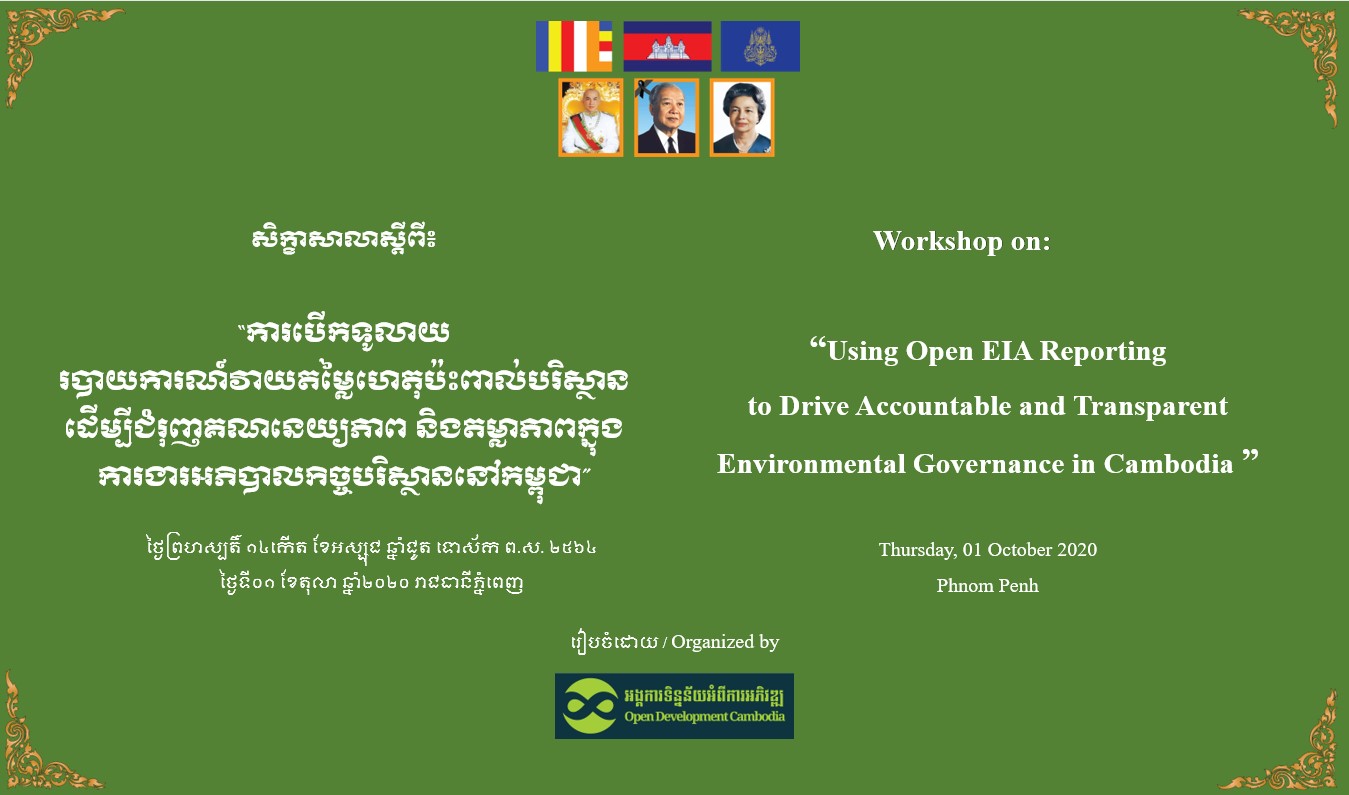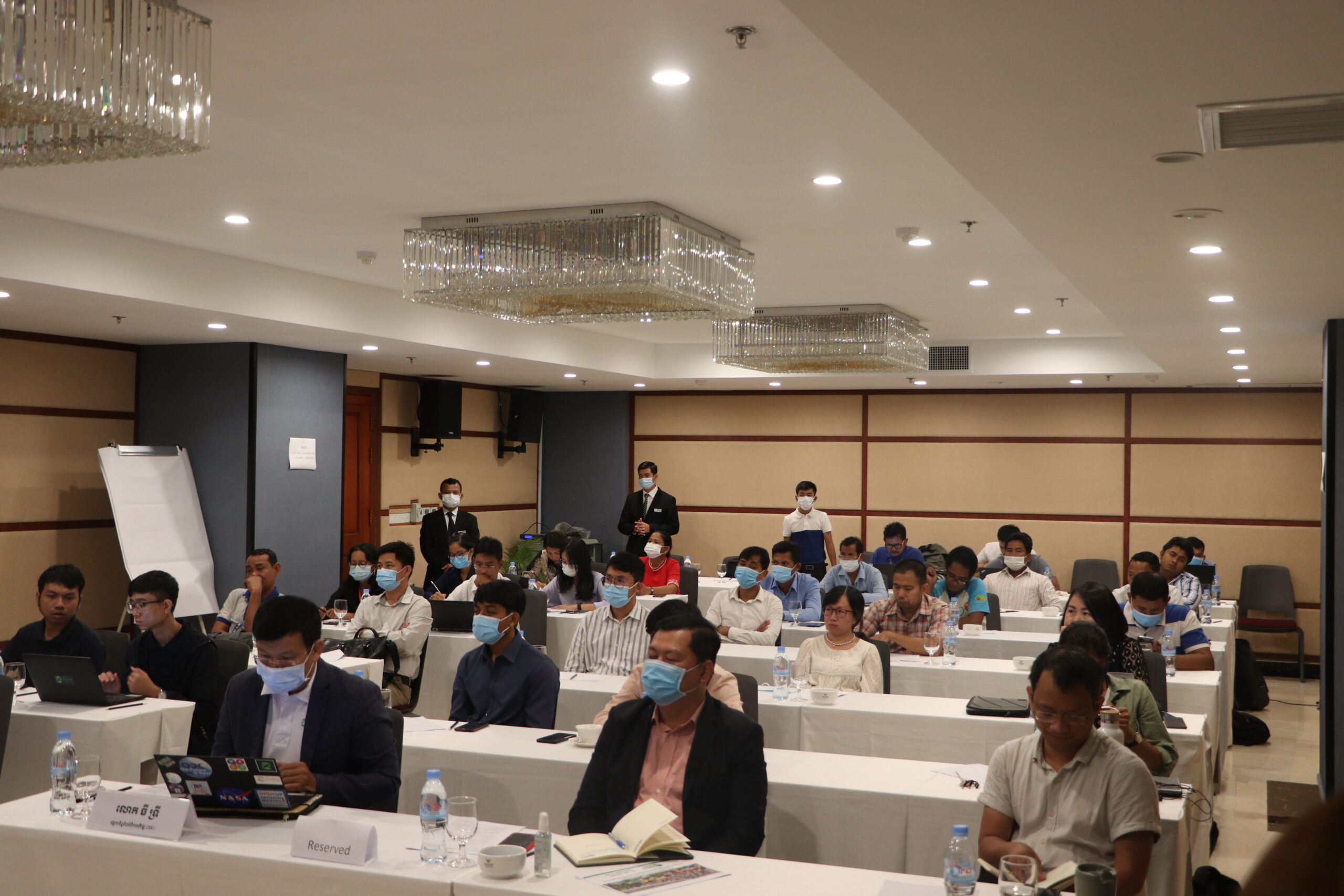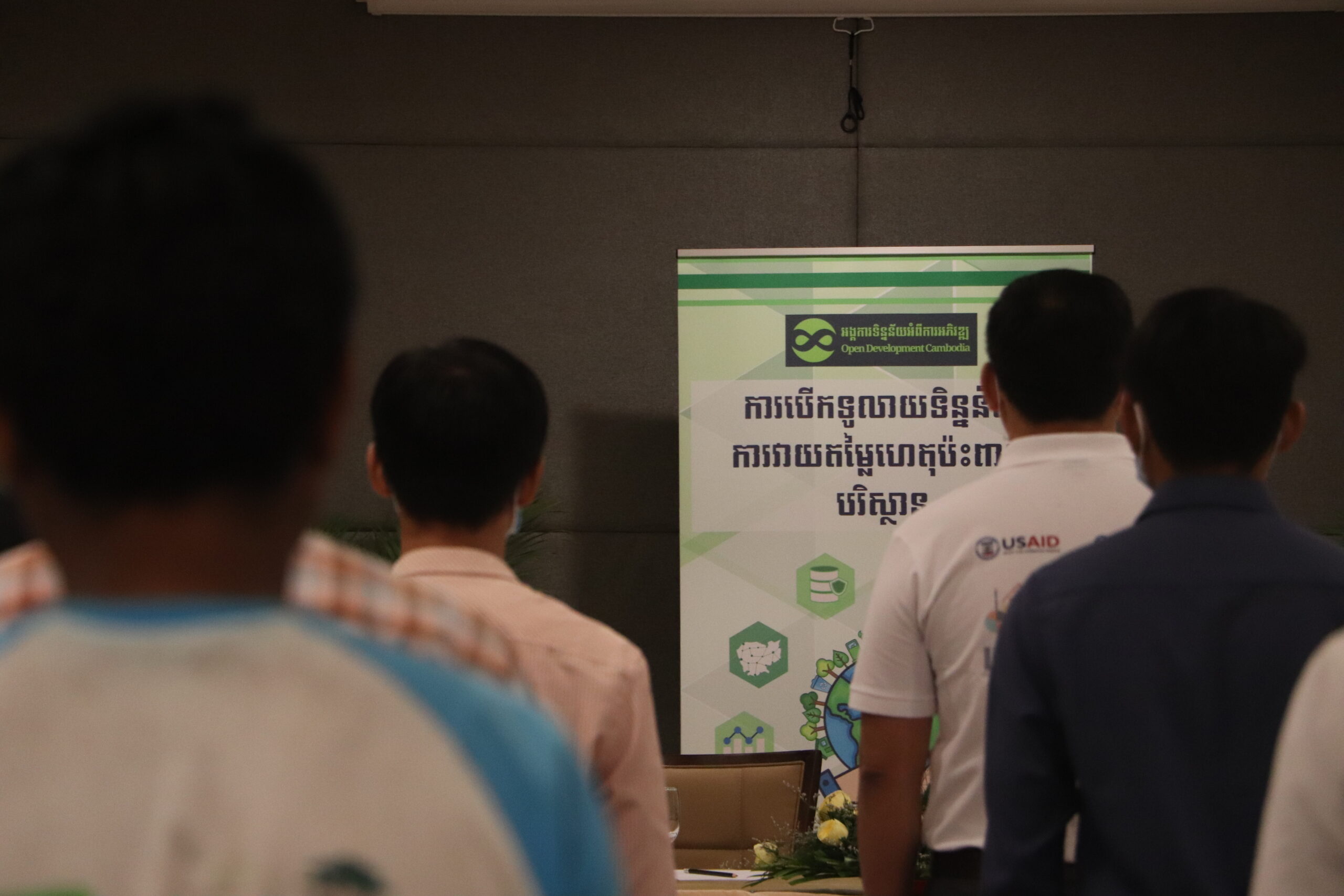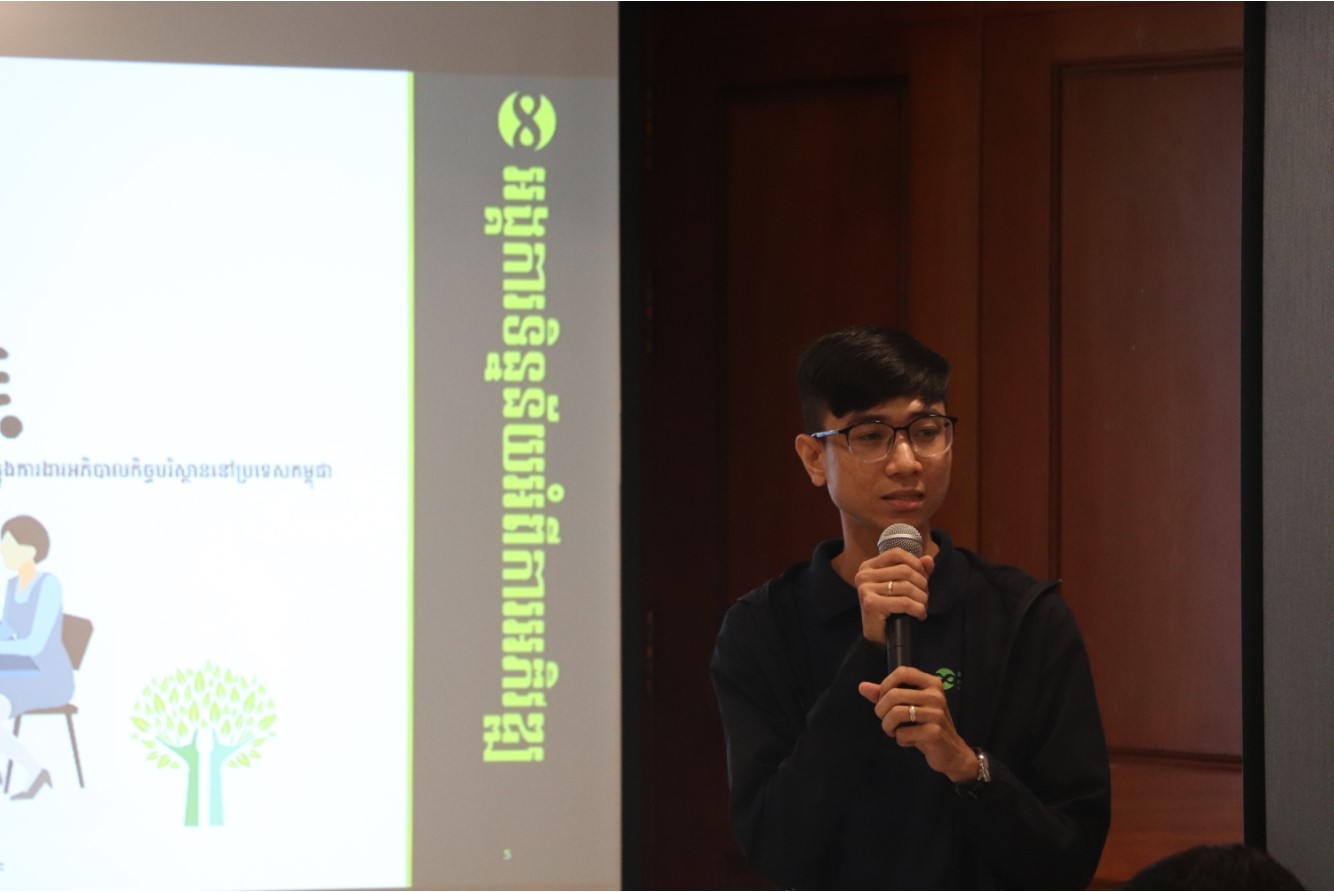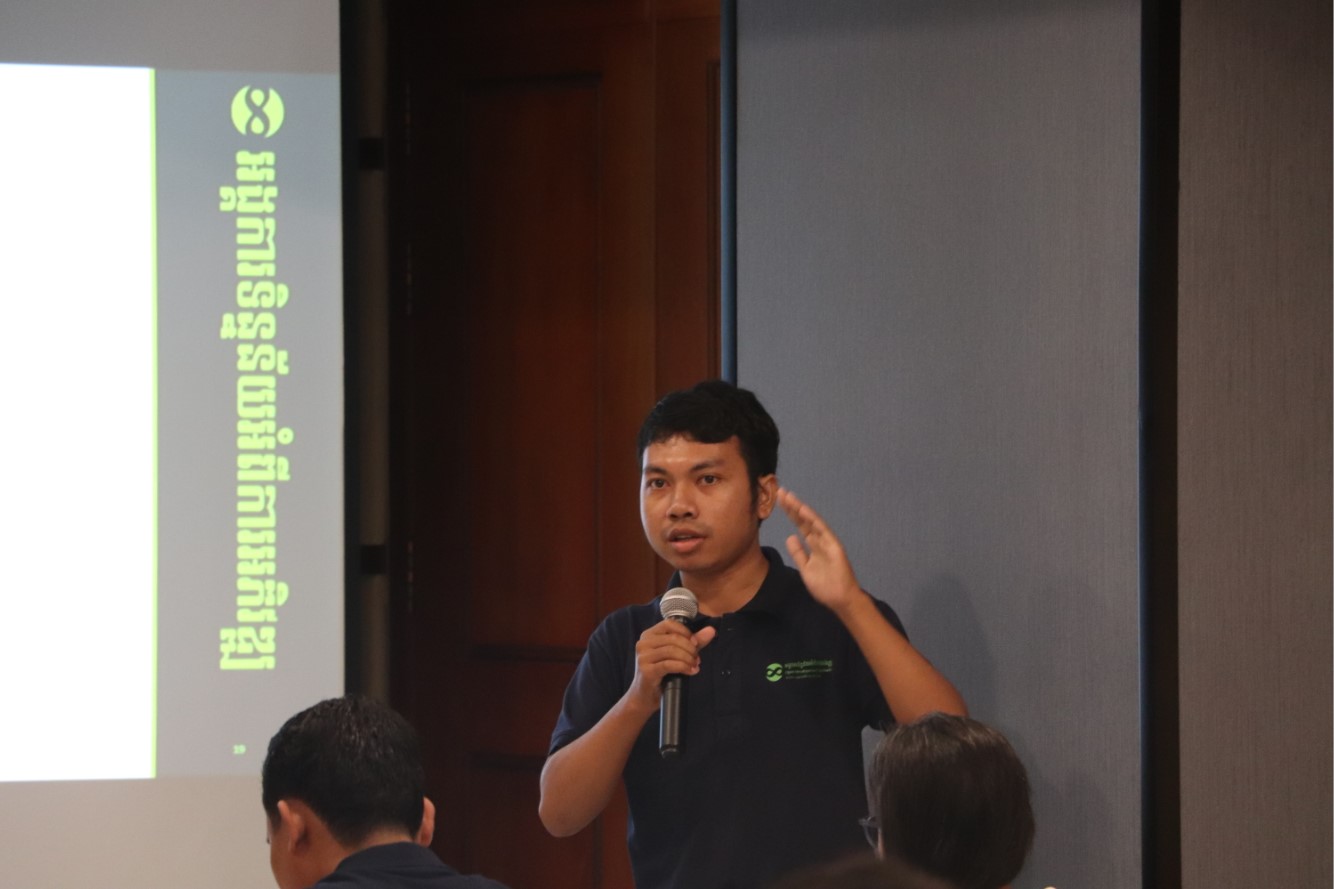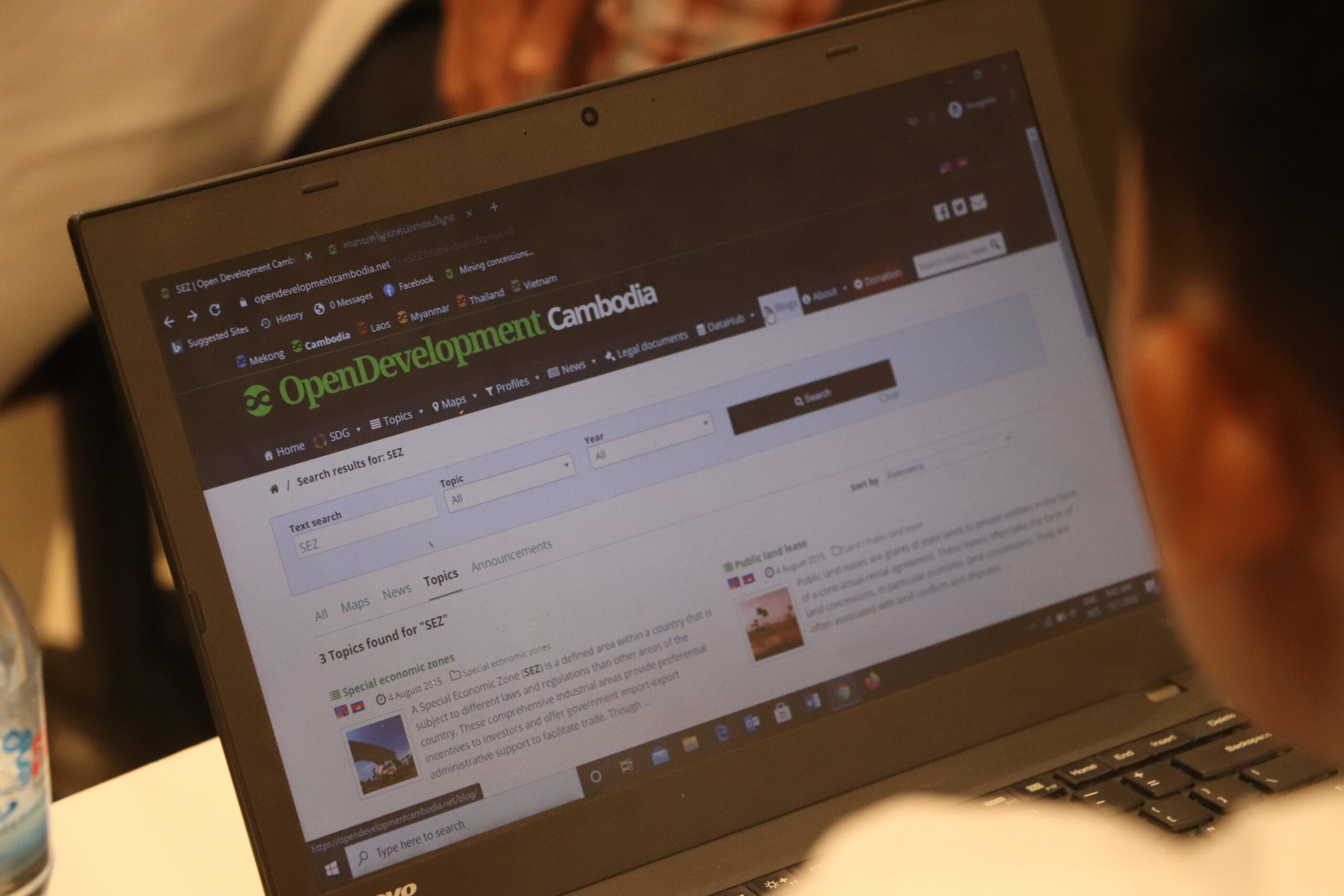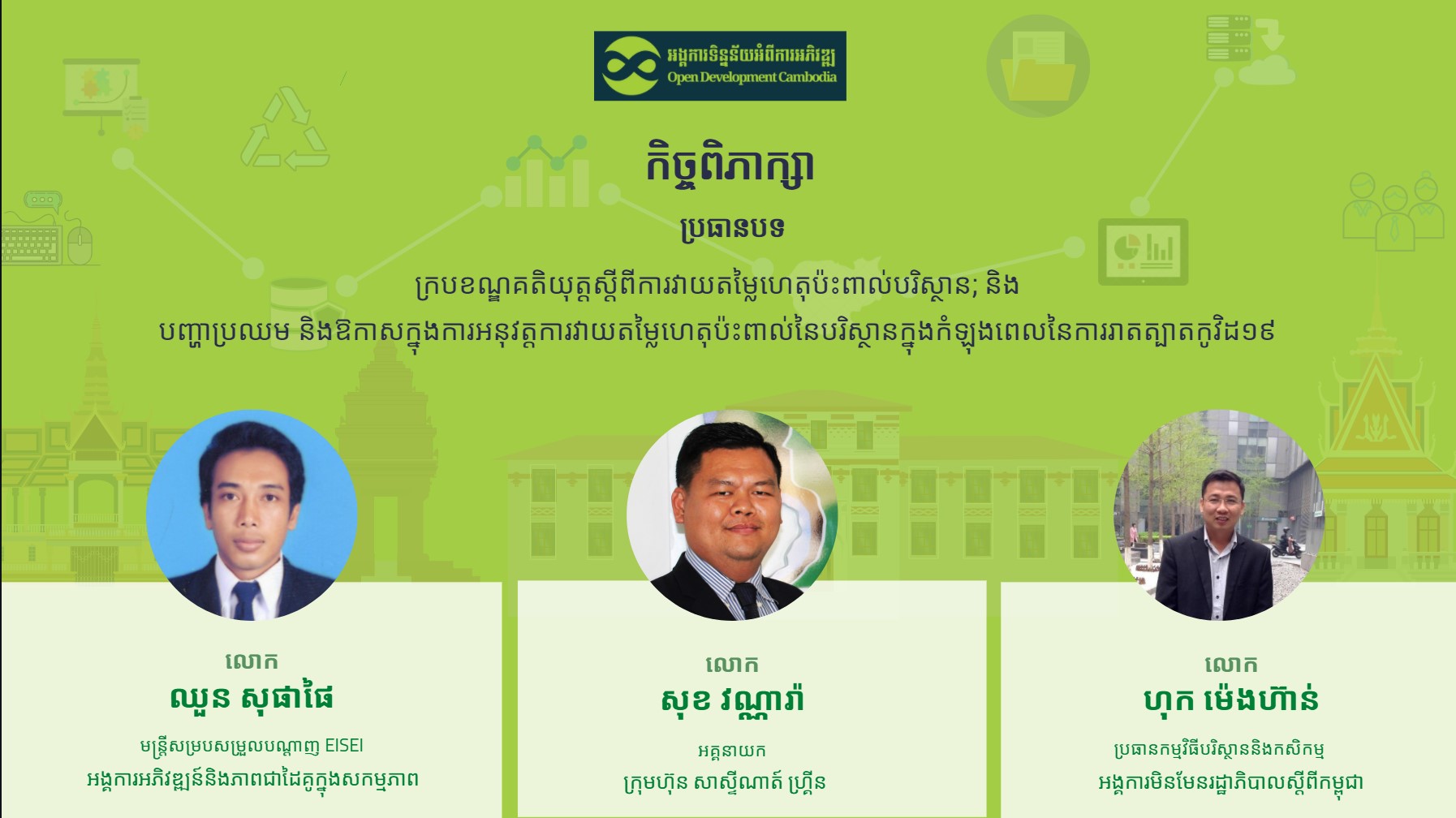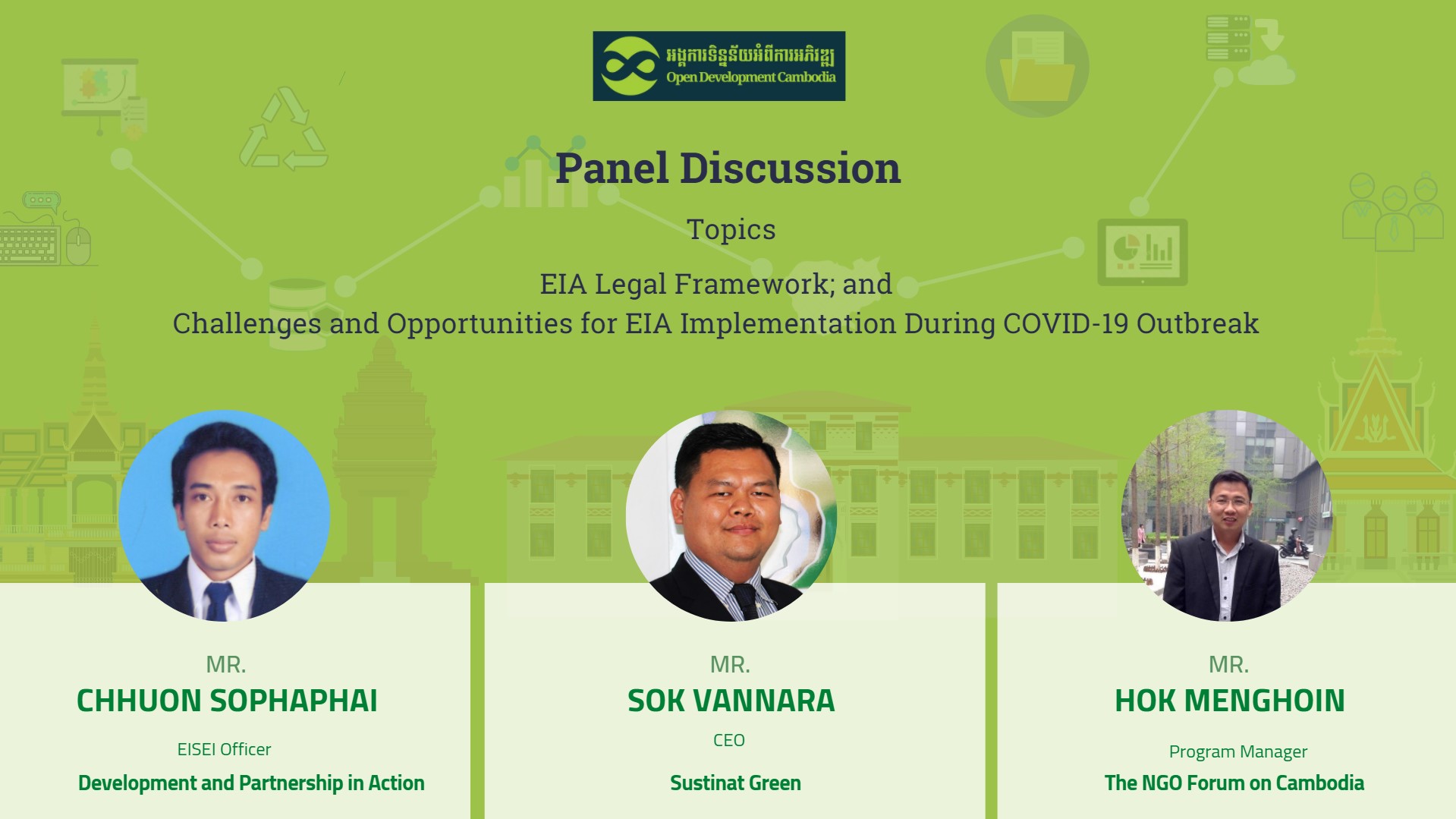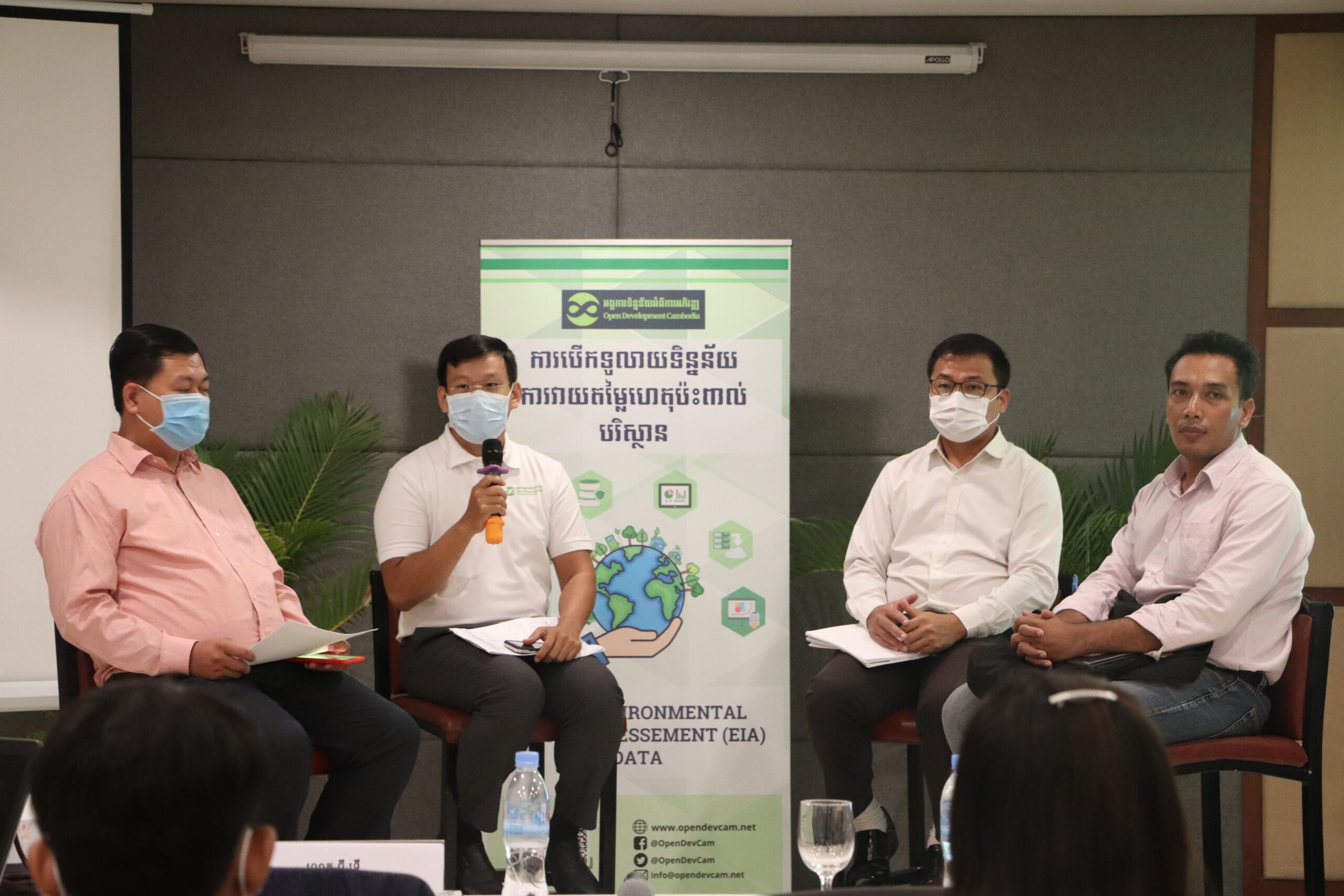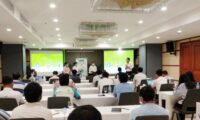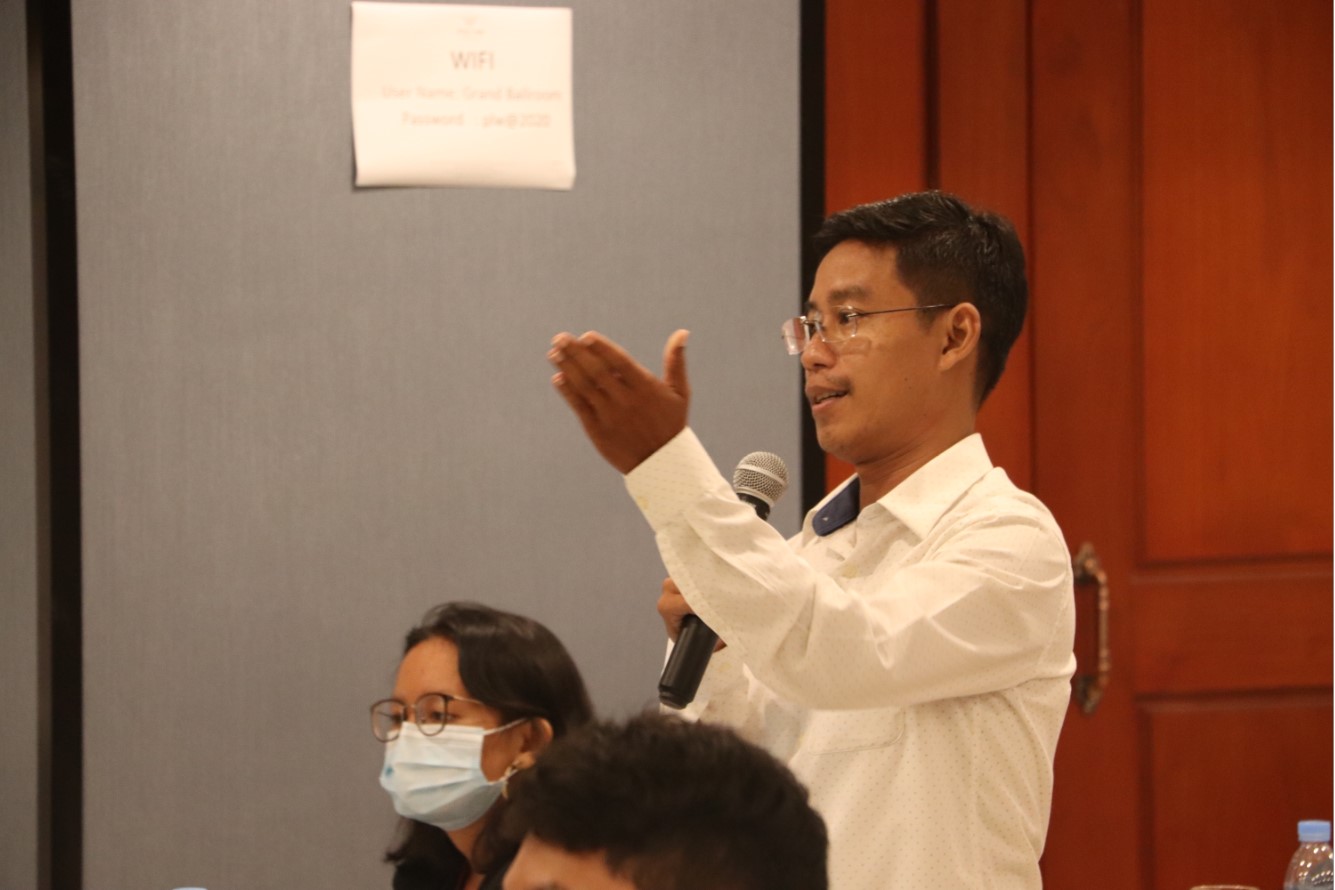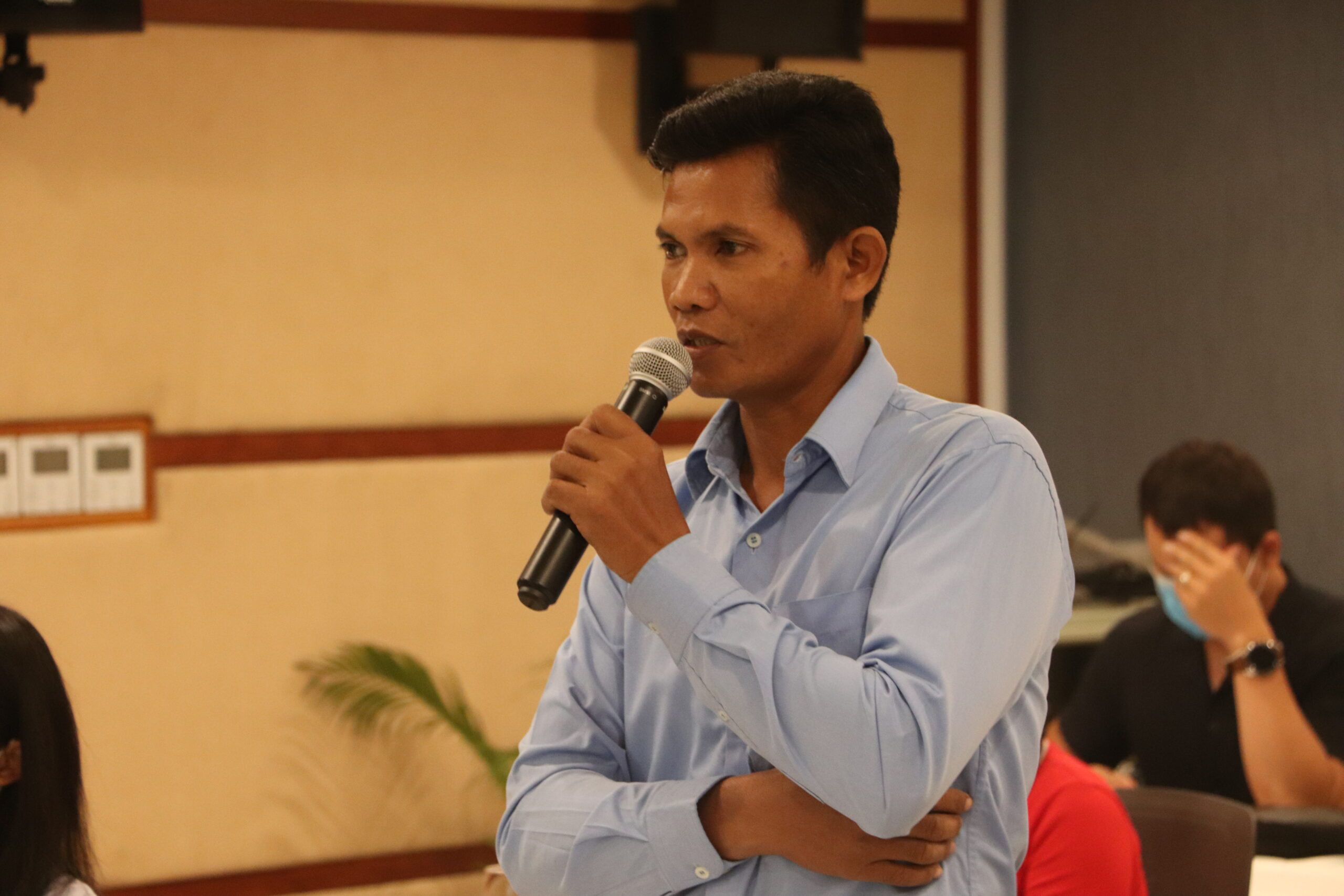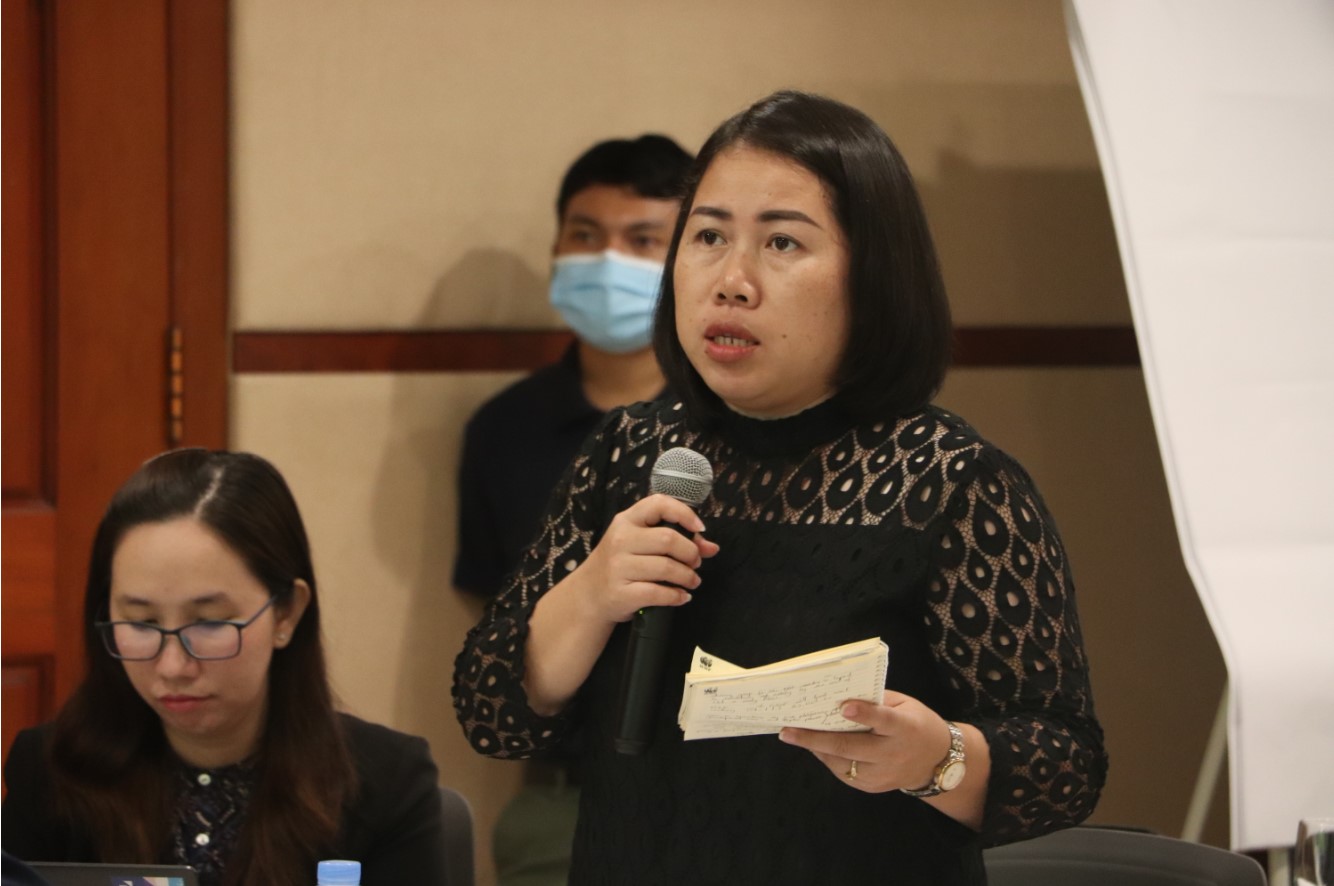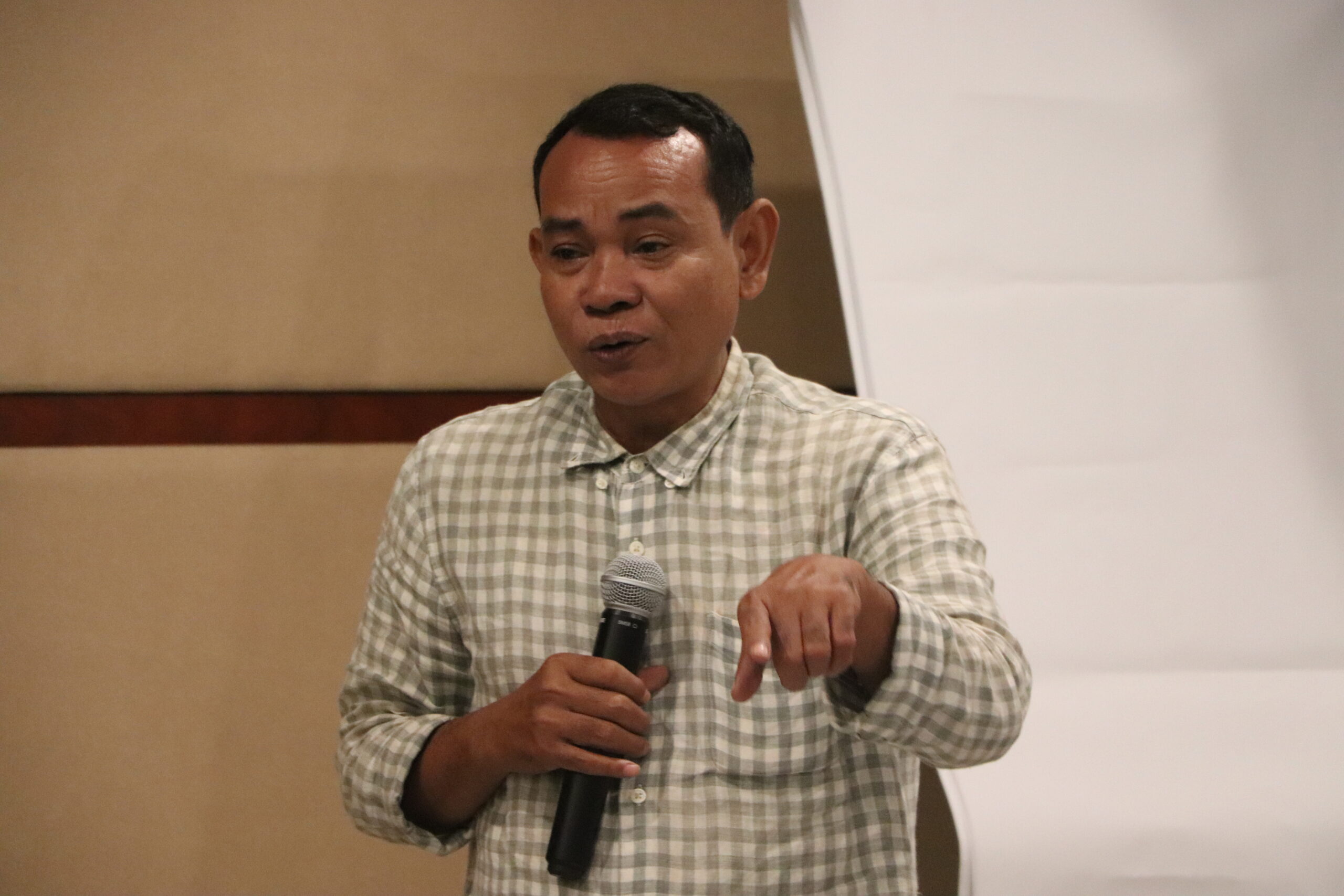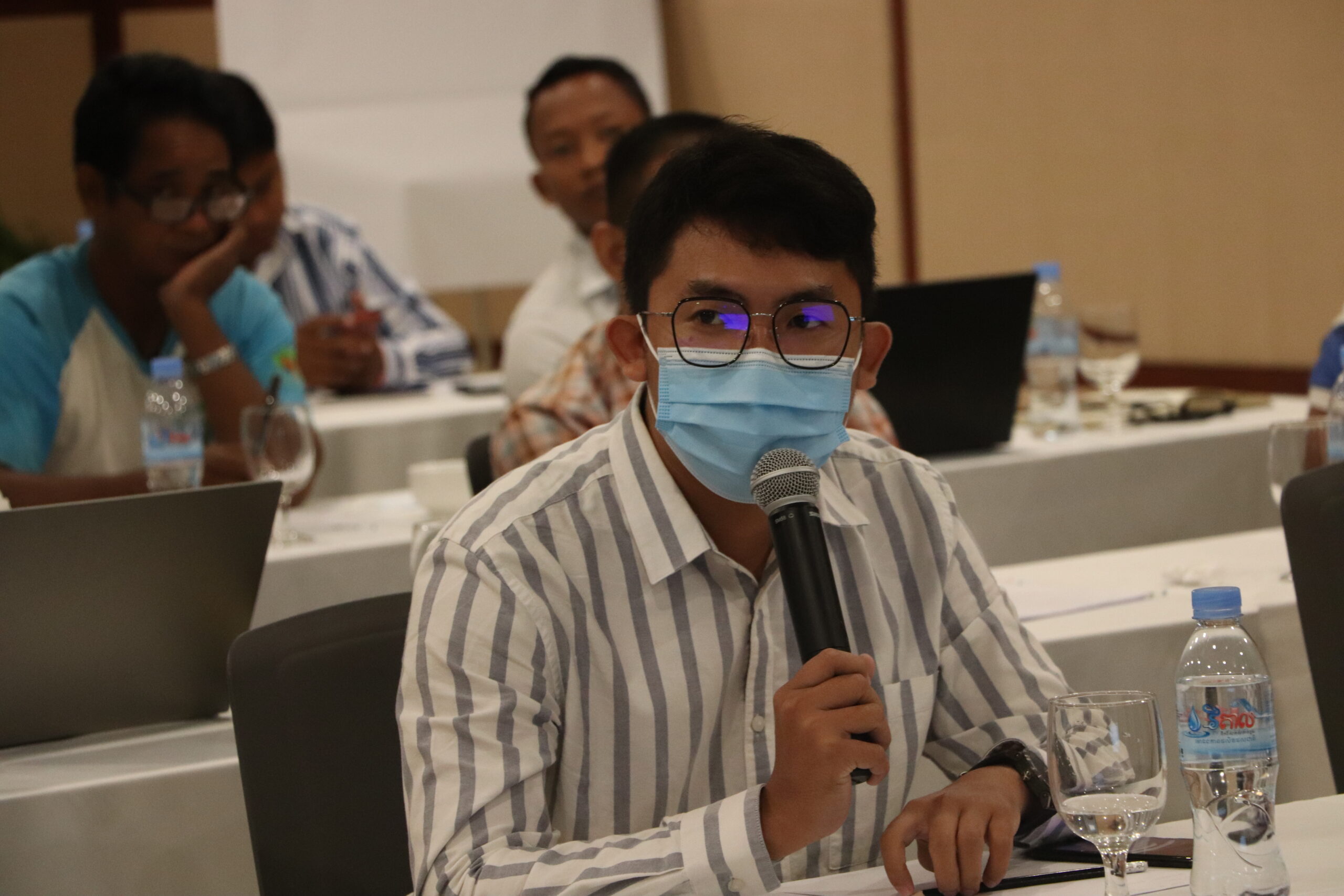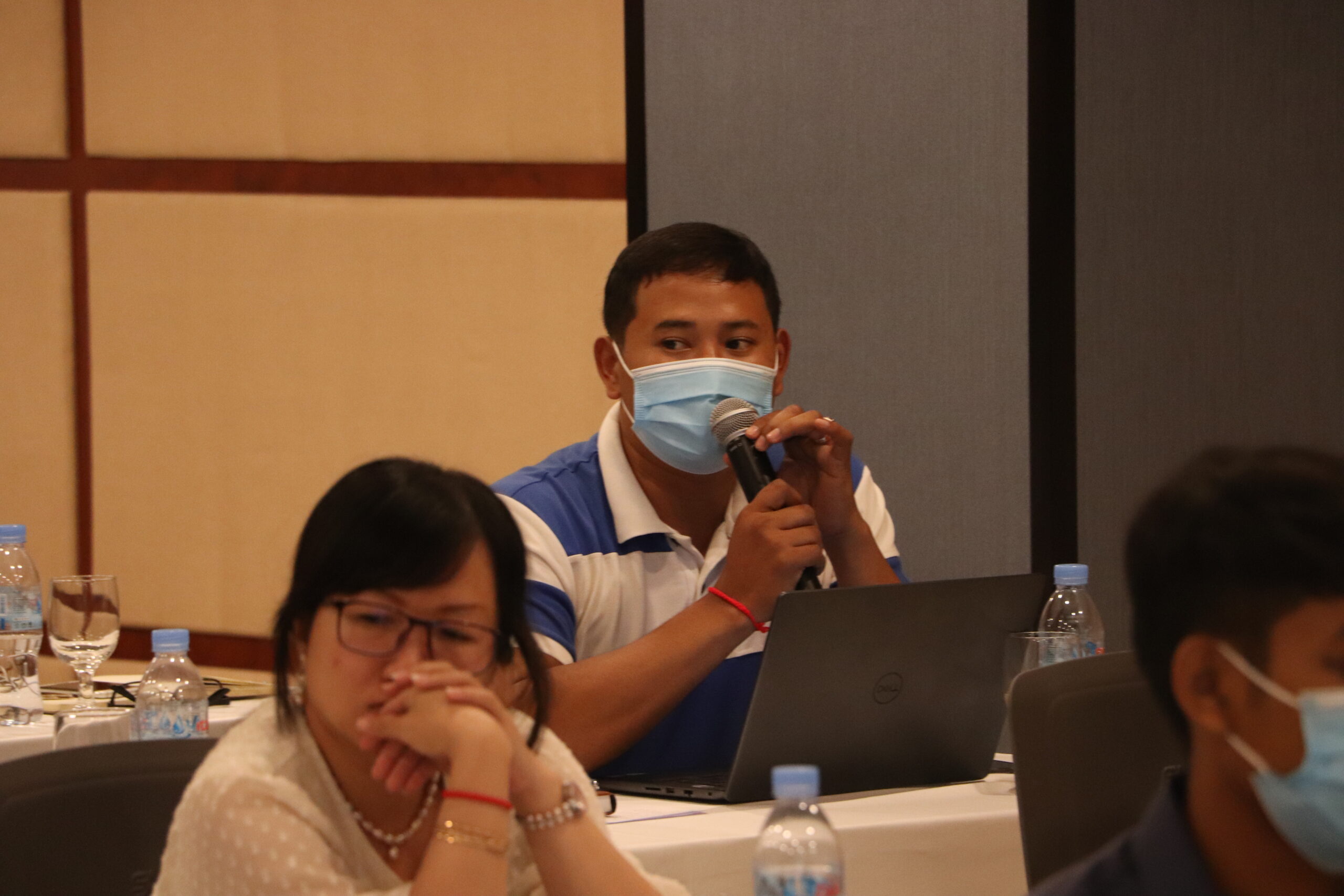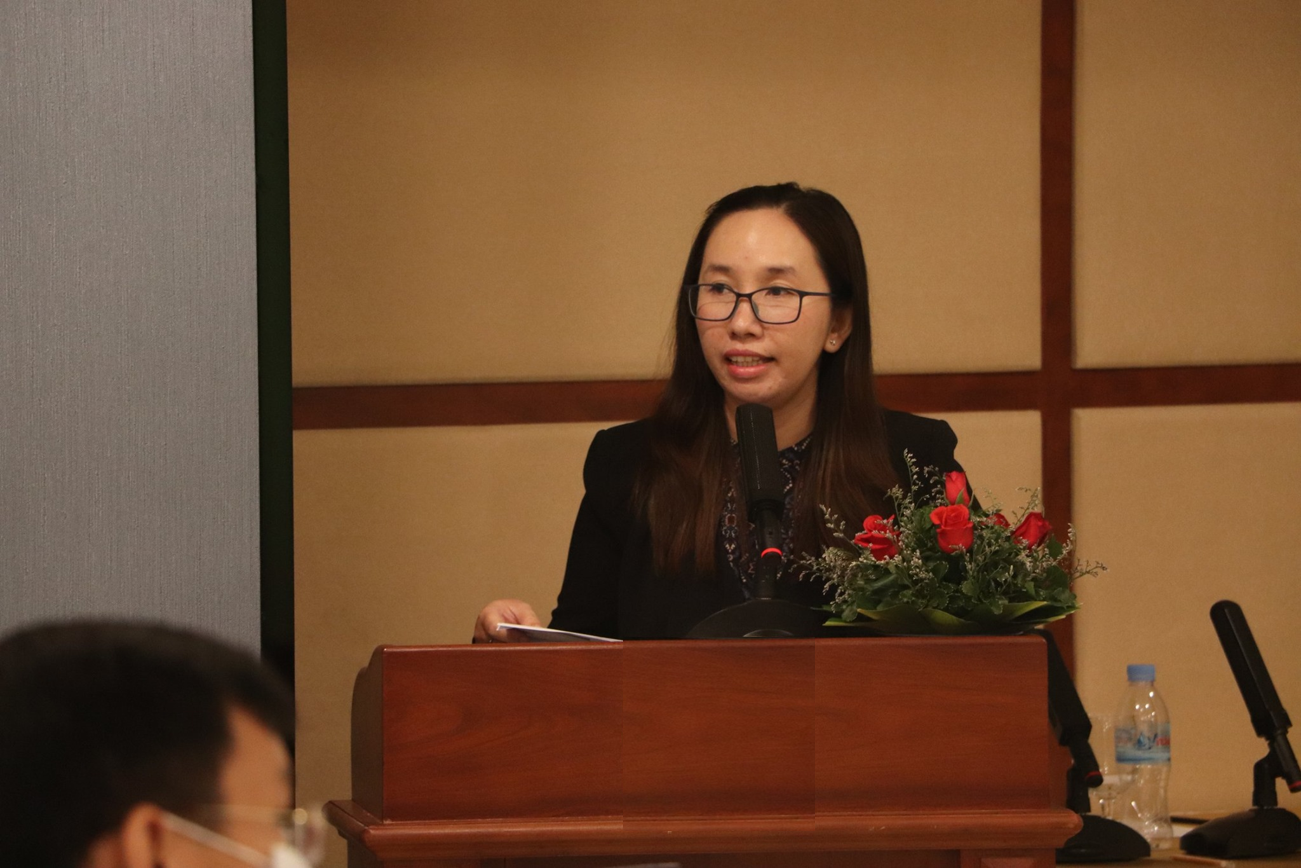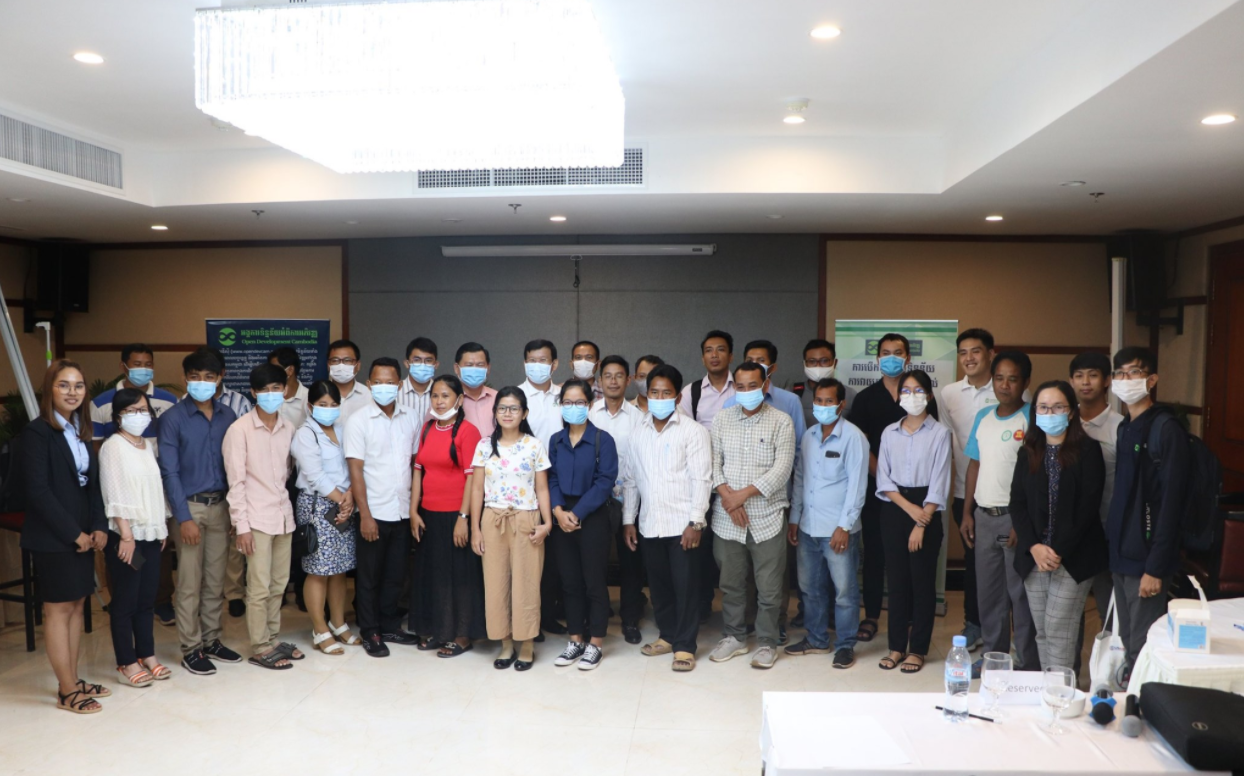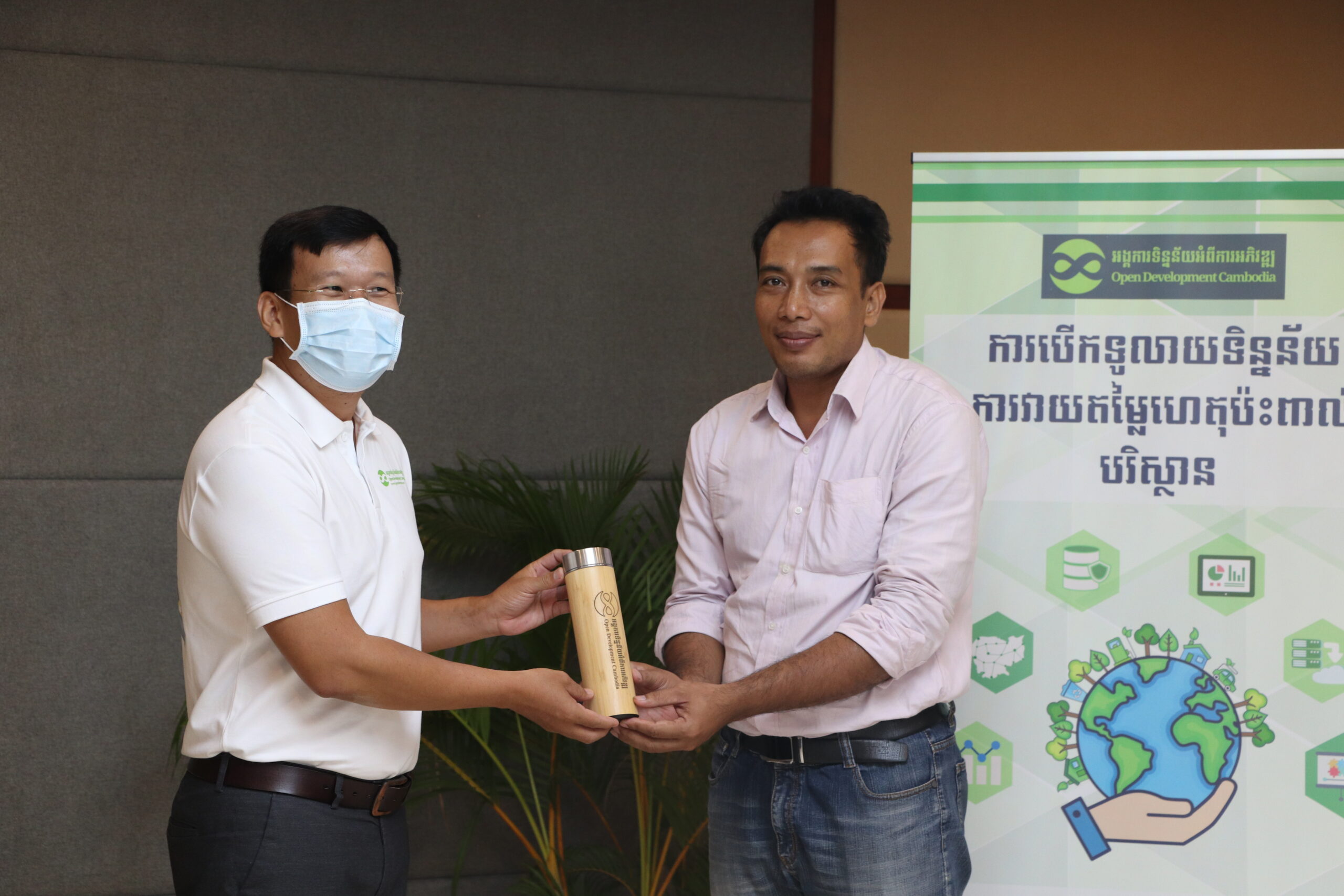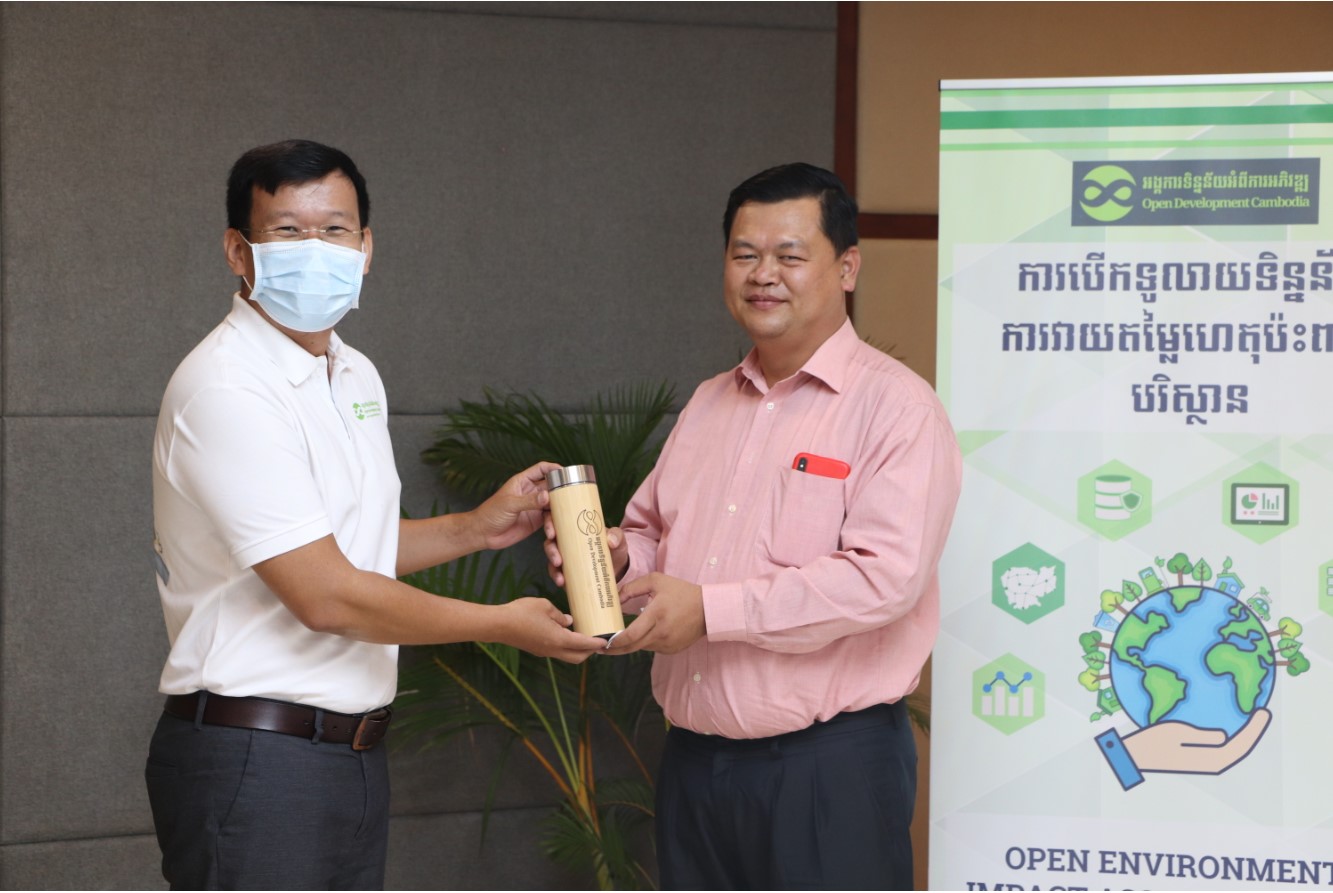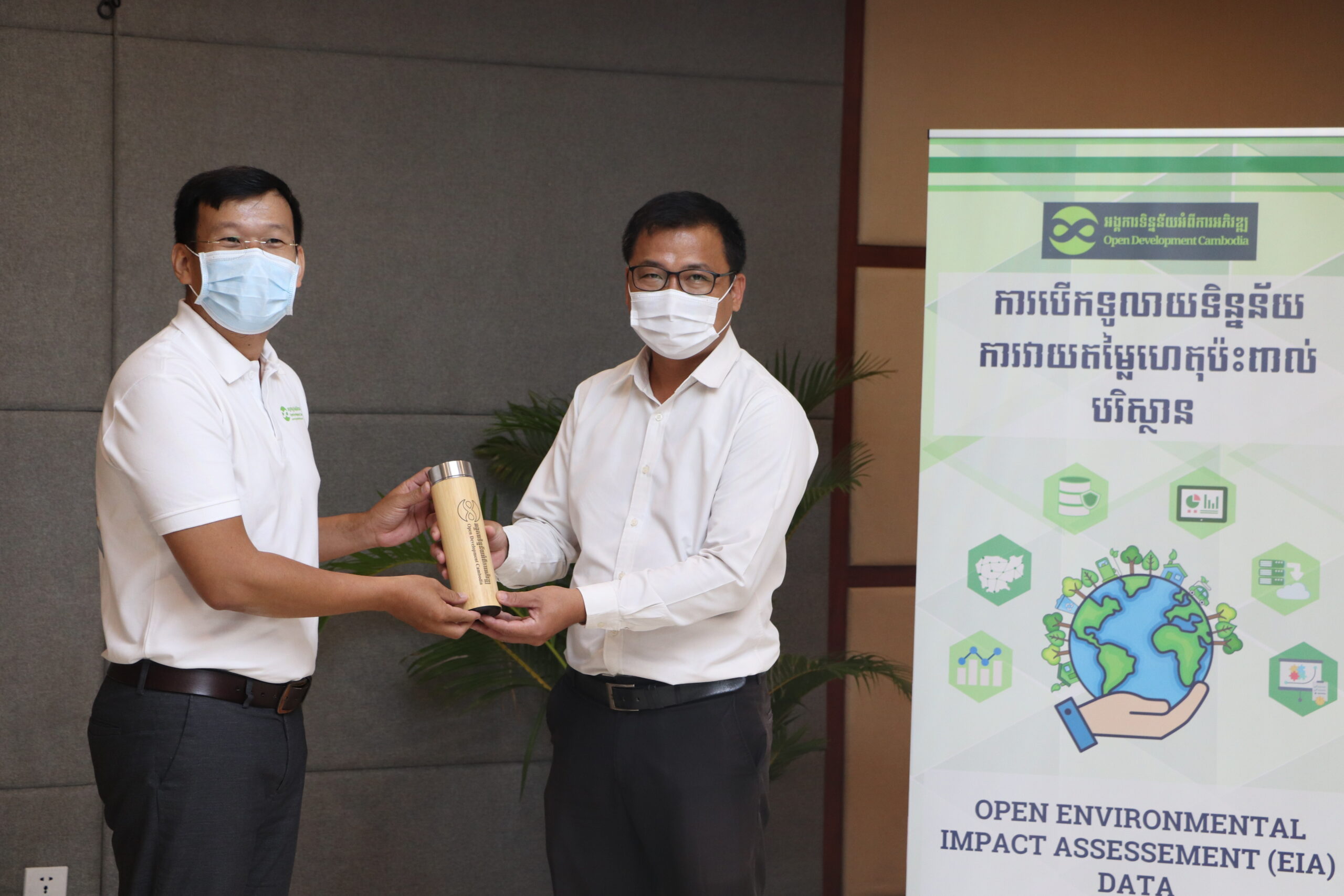សិក្ខាសាលាស្តីពី «ការបើកទូលាយរបាយការណ៍វាយតម្លៃហេតុប៉ះពាល់បរិស្ថាន ដើម្បីជំរុញគណនេយ្យភាព និងតម្លាភាពក្នុងការងារអភិបាលកិច្ចបរិស្ថានក្នុងប្រទេសកម្ពុជា»
នៅថ្ងៃទី០១ ខែតុលា ឆ្នាំ២០២០ អង្គការទិន្នន័យអំពីការអភិវឌ្ឍ (អូឌីស៊ី) បានរៀបចំសិក្ខាសាលារយៈពេលកន្លះថ្ងៃស្តីពី «ការបើកទូលាយរបាយការណ៍វាយតម្លៃហេតុប៉ះពាល់បរិស្ថាន ដើម្បីជំរុញគណនេយ្យភាព និងតម្លាភាពក្នុងការងារអភិបាលកិច្ចបរិស្ថាន»។ ព្រឹត្តិការណ៍នេះបានប្រមូលផ្តុំអ្នកចូលរួមចំនួន ៣៥ នាក់មកពីស្ថាប័នផ្សេងៗគ្នា រួមមានអង្គការក្រៅរដ្ឋាភិបាលក្នុងស្រុក និងអន្តរជាតិ សហគមន៍មូលដ្ឋាន និងប្រព័ន្ធផ្សព្វផ្សាយ ក៏ដូចជាពីវិស័យឯកជន និងសាធារណៈ។ ទោះបីមានវិធានការណ៍ និងការរឹតបណ្តឹងការជួបជុំដើម្បីបង្ការការឆ្លងជំងឺកូវីដ-១៩ យ៉ាងណាក្តី អូឌីស៊ី នៅតែអាចគ្រប់គ្រងក្នុងការធ្វើសិក្ខាសាលានេះឡើងបាន ដោយប្រកាន់យ៉ាងខ្ជាប់ខ្ជួននូវគោលការណ៍ណែនាំរបស់ក្រសួងសុខាភិបាល។
សិក្ខាសាលាមានគោលបំណងទីមួយ គឺដើម្បីធ្វើបច្ចុប្បន្នភាពវឌ្ឍនភាពនៃទំព័រព័ត៌មានទិន្នន័យអំពីរបាយការណ៍វាយតម្លៃហេតុប៉ះពាល់បរិស្ថាន (EIA) ស្របតាមសេចក្តីអត្ថាធិប្បាយ និងយោបល់ត្រលប់ដែលទទួលបាននៅក្នុងសិក្ខាសាលាសម្ពោធ និងធ្វើបទបង្ហាញពីសំណុំព័ត៌មានទិន្នន័យនៃគម្រោងអភិវឌ្ឍន៍ផ្សេងទៀតដែលមានផ្តល់ជូនជាសាធារណៈនៅលើគេហទំព័រអូឌីស៊ី។ ទីពីរ គឺដើម្បីលើកកម្ពស់ការយល់ដឹងជាសាធារណៈអំពីរបាយការណ៍ EIA និងយុទ្ធសាស្ត្រនានាដើម្បីពង្រឹងការចូលរួមជាសាធារណៈក្នុងការពិភាក្សាដោយផ្អែកលើអំនះអំនាង ឬភស្តុតាង។ ហើយគោលបំណងទី ៣ គឺដើម្បីអំពាវនាវឱ្យមានការសហការបន្ថែមទៀតពីភាគីពាក់ព័ន្ធ រួមមានរដ្ឋាភិបាល អង្គការសង្គមស៊ីវិល និងវិស័យឯកជន ក្នុងការចែករំលែករបាយការណ៍ EIA ពេញលេញ។
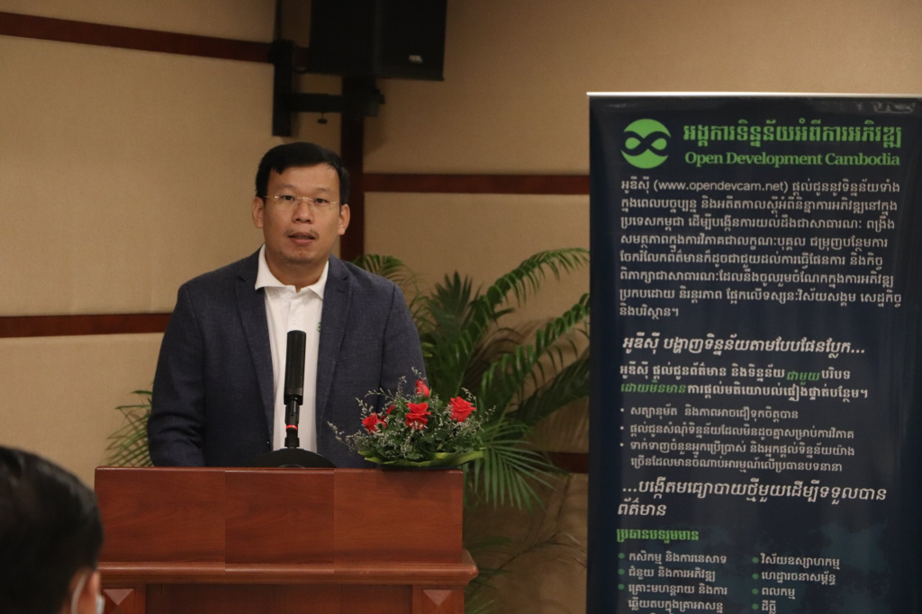
លោក ធី ទ្រី នាយកប្រតិបត្តិ/និពន្ធនាយកនៃអង្គការអូឌីស៊ី ឡើងថ្លែងសុន្ទរកថាស្វាគមន៍។
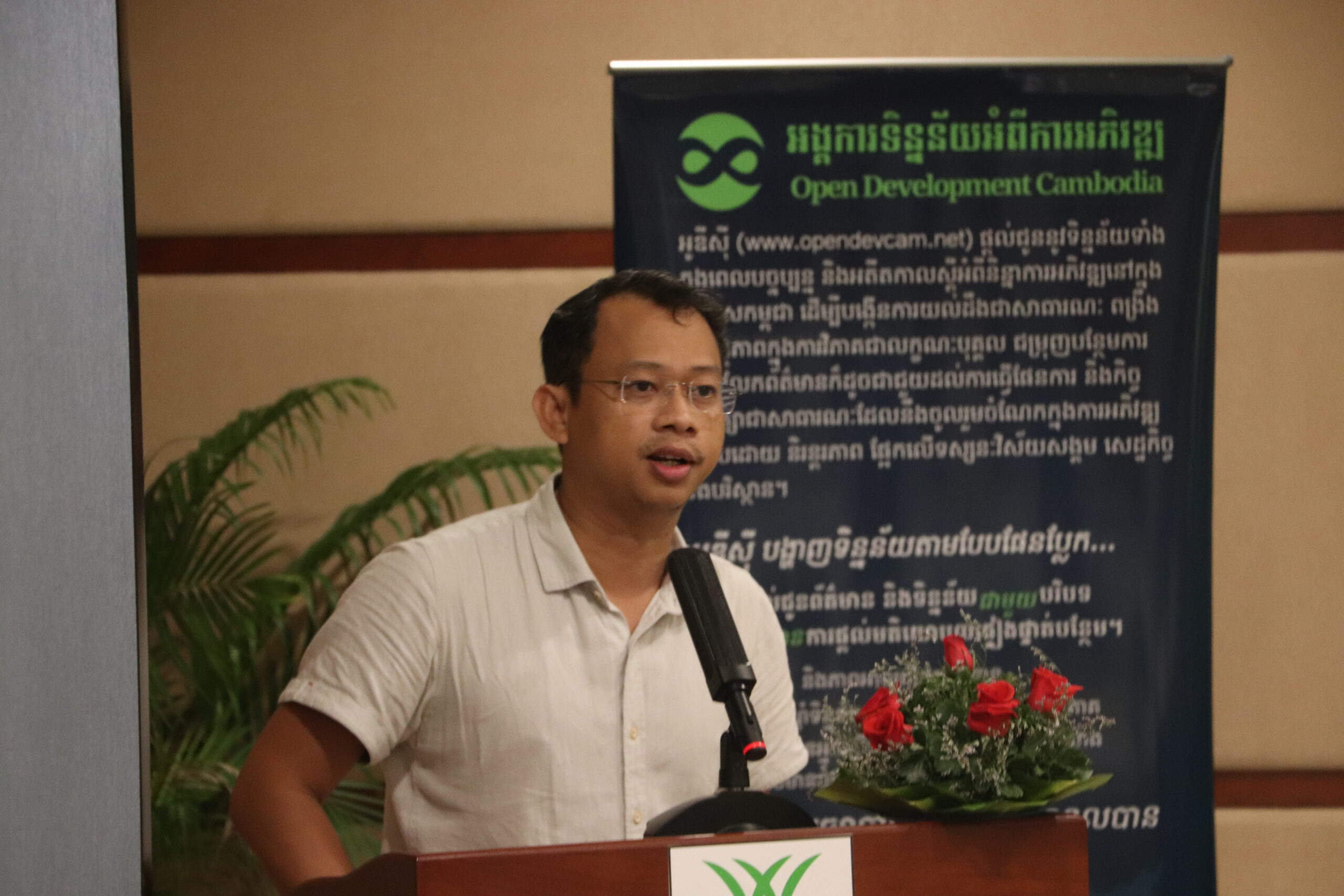
លោក ប៉ែន រតនា អ្នកសម្របសម្រួលកម្មវិធីអភិបាលកិច្ចធនធាន នៃការិយាល័យ Heinrich Boell Stiftung នៅកម្ពុជា ថ្លែងសុន្ទរកថាប្រកាសបើកកម្មវិធី។
សិក្ខាសិលានេះបានចាប់ផ្តើមជាមួយនឹងសុន្ទរកថាស្វាគមន៍របស់ លោក ធី ទ្រី នាយកប្រតិបត្តិអង្គការទិន្នន័យអំពីការអភិវឌ្ឍ (អូឌីស៊ី) ដែលបានឱ្យតម្លៃខ្ពស់ចំពោះឱកាសនៃការរៀបចំសិក្ខានេះជាលើកទី ២ បន្ទាប់ពីការផ្សព្វផ្សាយលើកទី ១ ដែលធ្លាប់បានធ្វើឡើងកាលពីឆ្នាំ ២០១៩។ លោកបានពន្យល់ថា អូឌីស៊ី បានប្រមូល និងផ្សព្វផ្សាយសំណុំទិន្នន័យជាច្រើនពាក់ព័ន្ធនឹងគម្រោងអភិវឌ្ឍន៍នានាក្នុងប្រទេសកម្ពុជាអស់រយៈពេលជាច្រើនឆ្នាំកន្លងមក ហើយទំព័រព័ត៌មានទិន្នន័យអំពីរបាយការណ៍វាយតម្លៃហេតុប៉ះពាល់បរិស្ថានថ្មីនេះ បានបន្ថែមទៅលើការងារដែល អូឌីស៊ី មានស្រាប់។ របាយការណ៍ EIA ដែលមាននៅលើអ៊ីនធឺណិតផ្តល់ឱកាសដល់អ្នកពាក់ព័ន្ធសំខាន់ៗ រួមទាំងសហគមន៍ដែលរងផលប៉ះពាល់ ដើម្បីស្វែងយល់ពីអត្ថប្រយោជន៍ និងបញ្ហាប្រឈមរបស់គម្រោង និងចូលរួមក្នុងដំណើរការរាយការណ៍ និងតាមដានទៅលើគម្រោងអភិវឌ្ឍន៍ផ្សេងៗបាន។
នៅក្នុងសុន្ទរកថាបើករបស់ លោក ប៉ែន រតនា អ្នកសម្របសម្រួលកម្មវិធីអភិបាលកិច្ចធនធាន នៃការិយាល័យ Heinrich Boell Stiftung នៅកម្ពុជា បានសង្កត់ធ្ងន់លើសារសំខាន់នៃរបាយការណ៍ EIA និងលើកទឹកចិត្តឱ្យមានការចូលរួមពីសាធារណជនឱ្យកាន់តែច្រើនថែមទៀត ដើម្បីពង្រឹងការអនុវត្តការត្រួតពិនិត្យយ៉ាងសកម្ម និងធ្វើឱ្យប្រសើរឡើងនៃអភិបាលកិច្ចបរិស្ថាន។ លោកក៏បានគូសបញ្ជាក់ពីការចូលរួមរបស់អង្គភាពរបស់លោក ក្នុងការធ្វើការជាមួយក្រសួងបរិស្ថានដើម្បីរៀបចំសេចក្តីព្រាងច្បាប់ស្តីពី EIA និងសេចក្តីព្រាងក្រមស្តីពីបរិស្ថាន និងធនធានធម្មជាតិ។
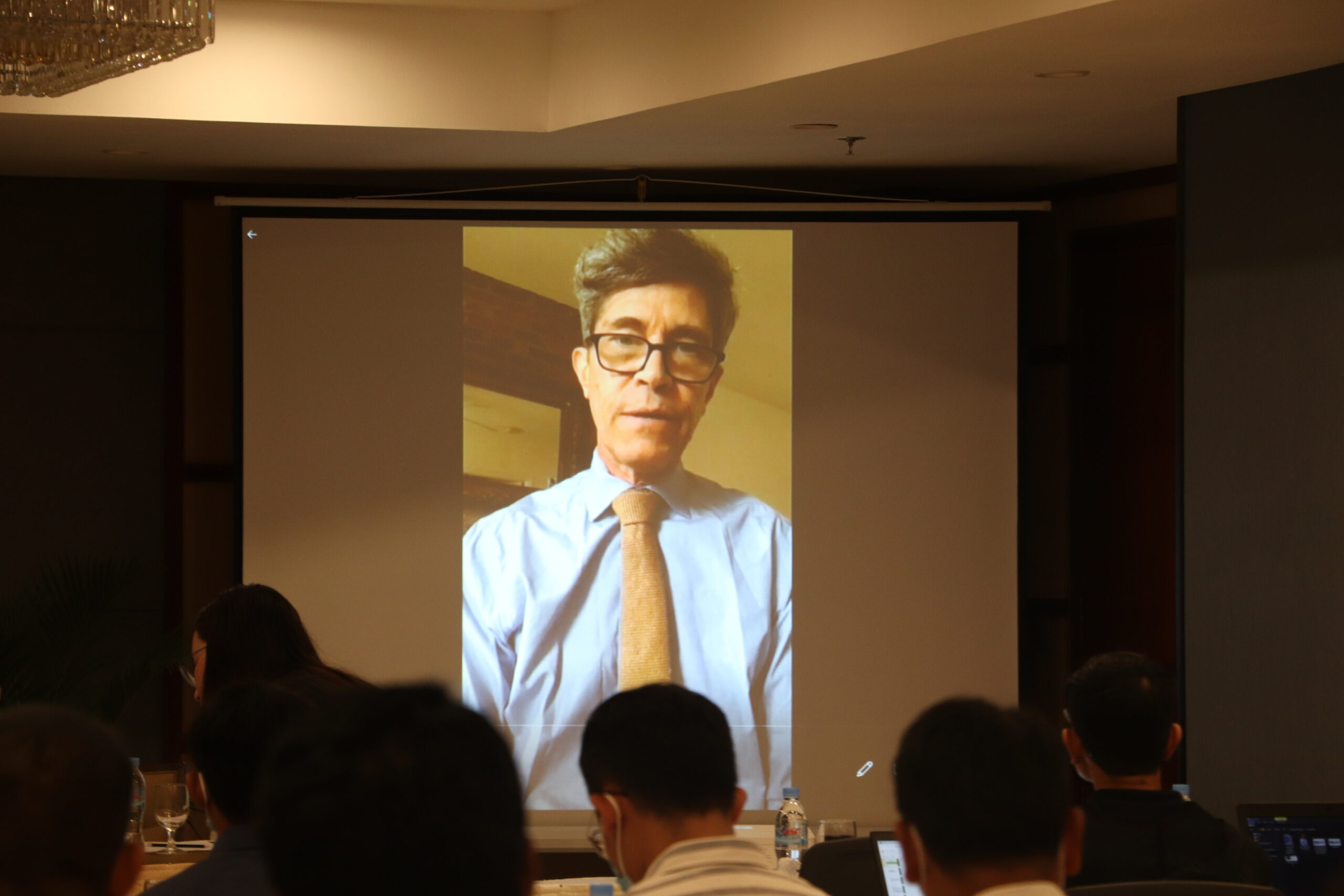
លោក វីល្លៀម វ៉ាដ ប្រធានដឹកនាំគម្រោង Green Equity Asia (GEA) កំពុងថ្លែងសុន្ទករថាគន្លឹះអំពីការចូលរួមជាសាធារណៈនៅក្នុងដំណើរការវាយតម្លៃហេតុប៉ះពាល់បរិស្ថាន (EIA)។
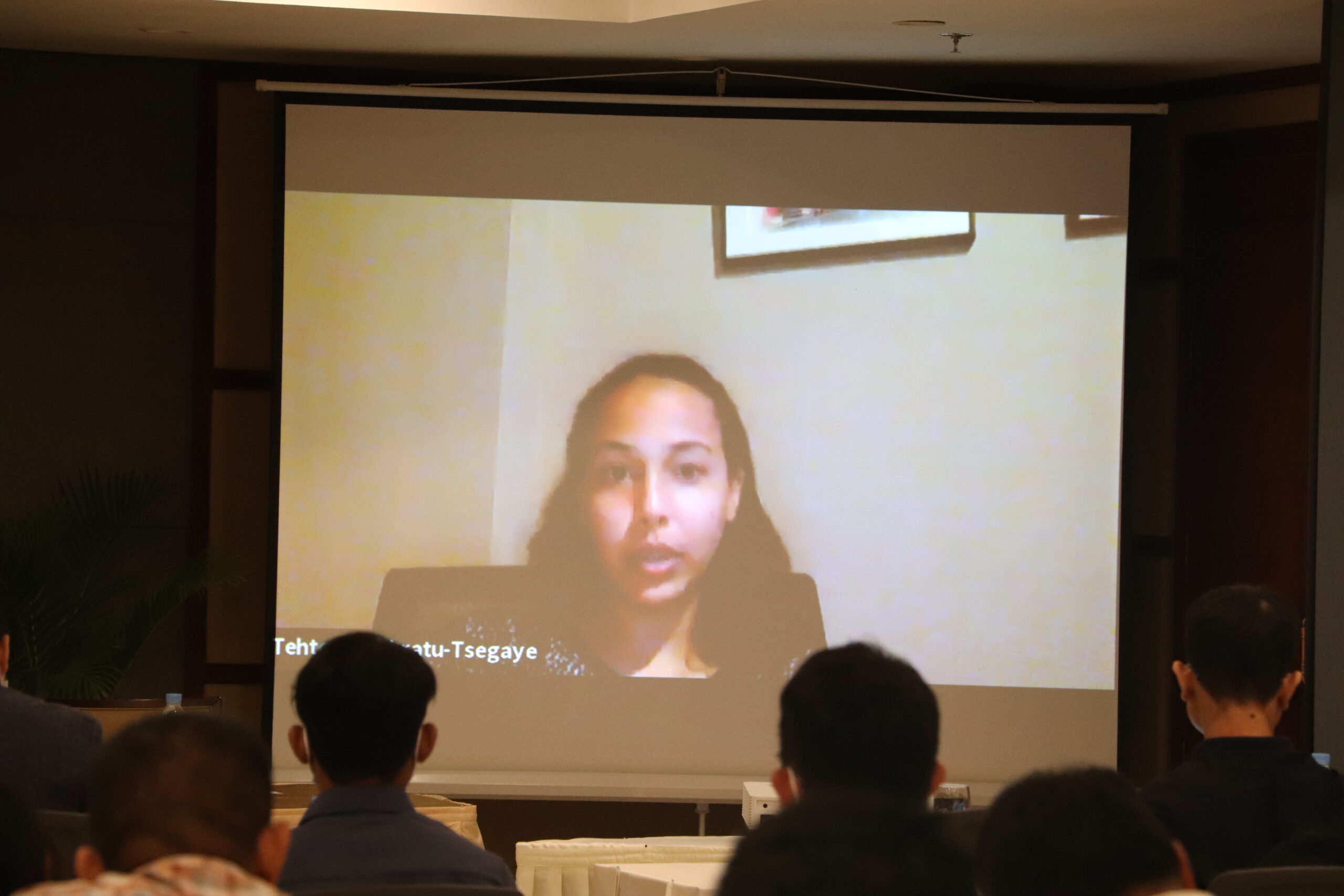
អ្នកស្រី តេថាណា ម៉េប្រាទូ- សេហ្កាយ៉េ អ្នកស្រាវជ្រាវជាន់ខ្ពស់ផ្នែកច្បាប់នៅមជ្ឈមណ្ឌល CSSI ផ្តល់សុន្ទរកថាគន្លឹះអំពីតួនាទីនៃការវាយតម្លៃហេតុប៉ះពាល់នៃបរិស្ថាន (EIA) ដើម្បីការវិនិយោគ និងការអភិវឌ្ឍប្រកបដោយចីរភាព។
កិច្ចបន្ទាប់មកទៀត លោក វីល្លៀម វ៉ាដ ប្រធានដឹកនាំគម្រោង Green Equity Asia (GEA) ដែលជាគំនិតផ្តួចផ្តើមពិសេសមួយនៃវិទ្យាស្ថាន East-West Management បានបង្ហាញពីសារៈសំខាន់នៃការចូលរួមរបស់សាធារណៈ និងតម្លាភាពនៅក្នុងគម្រោងអភិវឌ្ឍន៍។ ក្នុងសុន្ទរកថានេះដែរ លោក វីល្លៀម បានបន្ថែមថាគម្រោងនានាចាំបាច់ត្រូវការវាយតម្លៃទាក់ទងនឹងហេតុប៉ះពាល់ផ្នែកសេដ្ឋកិច្ច និងសង្គមក៏ដូចជាបរិស្ថាន។ ម្យ៉ាងវិញទៀតការចេញផ្សាយរបាយការណ៍ EIA ក៏អាចជម្រុញការពិភាក្សាក្នុងចំណោមសាធារណជន និងអាចឱ្យពួកគេផ្តល់ធាតុចូលសម្រាប់ការសម្រេចចិត្តល្អប្រសើរជាងមុន។
បន្ទាប់មកទៀត អ្នកស្រី តេថាណា ម៉េប្រាទូ- សេហ្កាយ៉េ អ្នកស្រាវជ្រាវជាន់ខ្ពស់ផ្នែកច្បាប់នៅមជ្ឈមណ្ឌលកូឡុំបៀស្តីពីការវិនិយោគប្រកបដោយចីរភាព (CSSI) បានពន្យល់ដោយសង្ខេបពីការងាររបស់អ្នកស្រីលើការវិនិយោគ និងការអភិវឌ្ឍប្រកបដោយចីរភាព ដោយផ្អែកលើការរកឃើញសំខាន់ៗនៃគម្រោង EIA នាពេលថ្មីៗនេះរបស់គម្រោង CCSI។ អ្នកស្រីបានសង្កត់ធ្ងន់ថា តម្លាភាពគឺជាជំហានដំបូងចាំបាច់ក្នុងការសម្របសម្រួលការចូលរួមជាសាធារណក្នុងដំណើរការធ្វើសេចក្តីសម្រេចចិត្ត ដែលក្នុងនោះអ្នកចូលរួម និងសម្លេងមកពីគ្រប់មជ្ឈដ្ឋានគួរតែត្រូវបានតំណាងឱ្យចូលរួមនៅក្នុងការពិគ្រោះយោបល់។ លើសពីនេះ អ្នកស្រីក៏បានសង្កត់ធ្ងន់ពីសារៈសំខាន់នៃការធ្វើឱ្យរាល់ព័ត៌មានពាក់ព័ន្ធនឹងរបាយការណ៍ EIA អាចចូលប្រើប្រាស់បាន ក្នុងទម្រង់មួយដែលមិនមានភាពលំអៀង ស្របតាមបរិបទ អាចចូលមើលបាន និងមានលក្ខណៈសមស្របទៅនឹងវប្បធម៌។
បន្ទាប់មកក្រុមការងារ អូឌីស៊ី បានបង្ហាញពីទិន្នន័យដែលមាននៅលើវេទិកាបើកទូលាយរបស់ខ្លួន ដោយផ្តោតលើទិន្នន័យស្តីពីការវាយតម្លៃហេតុប៉ះពាល់បរិស្ថាន តំបន់សេដ្ឋកិច្ចពិសេស វារីអគ្គិសនី ជាដើម។ ក្រុមការងារក៏បានពន្យល់ផងដែរពីមុខងាររបស់គេហទំព័រ ដូចជាផែនទីអន្តរកម្ម និងរបៀបទាញយកទិន្នន័យ។
កិច្ចពិភាក្សាដ៏គួរឱ្យចាប់អារម្មណ៍នៃសិក្ខាសាលានេះមានការអញ្ជើញចូលរួមពីវាគ្មិនដូចជា លោក សុខ វណ្ណារ៉ា អគ្គនាយកក្រុមហ៊ុន សាស្ទីណាត៍ហ្គ្រីន (ក្រុមហ៊ុន EIA), លោក ហុក ម៉េងហ៊ាន់ ប្រធានកម្មវិធីបរិស្ថាននិងកសិកម្មនៃវេទិកានៃអង្គការមិនមែនរដ្ឋាភិបាលស្តីពីកម្ពុជា (NGOF) និង លោក ឈួន សុផាផៃ មន្ត្រីមកពីអង្គការអភិវឌ្ឍន៍ និងភាពជាដៃគូក្នុងសកម្មភាព (DPA) ហើយក្នុងនោះមាន លោក ធី ទ្រី ជាអ្នកសម្របសម្រួលក្នុងកិច្ចពិភាក្សា។
សំដៅទៅលើការអនុវត្ត EIA លោក វណ្ណារ៉ា បានលើកឡើងថាការរីករាលដាលនៃជំងឺកូវីដ-១៩ បានបណ្តាលឱ្យមានការថយចុះយ៉ាងខ្លាំងនូវតម្រូវការលើសេវាពិគ្រោះយោបល់ហេតុប៉ះពាល់បរិស្ថាន (EIA) ដោយសារតែការធ្លាក់ចុះយ៉ាងគំហុកនៃគម្រោងថ្មីៗ និងការពន្យាពេលទៅលើការសិក្សាវាយតម្លៃ EIA ទៅលើគម្រោងដែលមានស្រាប់។ លោកបានពន្យល់ទៀតថា «ការរឹតត្បិតការប្រមូលផ្តុំសាធារណៈបានរារាំងសកម្មភាពរបស់យើង ដូចជាការស្ទង់មតិនៅក្បែរទីតាំងគម្រោង ការពិគ្រោះយោបល់សាធារណៈ និងការប្រជុំពិគ្រោះយោបល់នៅអន្តរក្រសួង។ អ្វីដែលយើងអាចធ្វើបានគឺការប្រជុំពីចម្ងាយ ឬការតេទូរស័ព្ទ» ។ ទាក់ទងនឹងបញ្ហានេះដែរ លោកបានស្នើឱ្យក្រសួងបរិស្ថានពិចារណាលើការធ្វើវិសោធនកម្ម ឬកែសម្រួលនីតិវិធីដើម្បីពន្លឿនដំណើរការ EIA និងពង្រឹងការអនុវត្តច្បាប់ និងបទបញ្ជាបរិស្ថានផ្សេងៗ។
តំណាងមកពី បណ្តាញអភិវឌ្ឍន៍ និងភាពជាដៃគូក្នុងសកម្មភាព ដែលធ្វើការពាក់ព័ន្ធនឹងឧស្សាហកម្មនិស្សារណកម្ម សង្គម និងបរិស្ថាន (DPA-EISEI) លោក សុផាផៃ បានលើកឡើងថា ក្រៅពីផលប៉ះពាល់នៃកូវីដ-១៩ បណ្តាញរបស់លោកក៏ប្រឈមនឹងបញ្ហាគួរឱ្យកត់សម្គាល់ផ្សេងទៀតផងដែរទៅលើការអនុវត្តនៃការត្រួតពិនិត្យ EIA នៅក្នុងឧស្សាហកម្មនិស្សារណកម្ម ដូចជាជំនាញបច្ចេកទេស ធនធានហិរញ្ញវត្ថុ និងកង្វះការយល់ដឹង។
លោកបានលើកឡើងថា «ក្នុងន័យនេះអ្វីដែលអង្គការសង្គមស៊ីវិលអាចធ្វើបាន គឺពិនិត្យលើសេចក្តីព្រាងរបាយការណ៍បរិស្ថានដែលចែករំលែកដោយនាយកដ្ឋាន EIA និងបន្ទាប់ពីនោះទៀតធ្វើការផ្ទៀងផ្ទាត់នៅទីតាំងគម្រោង។ ឧទាហរណ៍យើងអាចចូលទៅទីតាំងក្រុមហ៊ុន ហើយអង្កេតថាតើក្រុមហ៊ុនធ្វើដូចអ្វីដែលមានចែងនៅក្នុងរបាយការណ៍ EIA ឬអត់។ ហើយចំពោះករណីខ្លះទៀត យើងត្រូវបានហាមឃាត់មិនឱ្យចូលនោះឡើយ»។
ក្នុងនោះដែរ លោក ម៉េងហ៊ាន់ បានបន្ថែមទៀតថាភាពមានកំណត់ក្នុងការទទួលបាននូវរបាយការណ៍ចុងក្រោយ EIA កង្វះការយល់ដឹងអំពី EIA ការចូលរួមជាសាធារណៈនៅទាបនៅឡើយក្នុងដំណើរការពិគ្រោះយោបល់ និងបញ្ហាប្រឈមក្នុងការត្រួតពិនិត្យ និងការអនុវត្តគោលនយោបាយ សុទ្ធសឹងតែរារាំងការចូលរួមរបស់អង្គការសង្គមស៊ីវិល ក៏ដូចជាការធ្វើឱ្យត្រូវគ្នាទៅនឹងគោលការណ៍ក្នុងតំបន់ និងអន្តរជាតិ។ លោកបានលើកឡើងទៀតថា អ្នកជំនាញបច្ចេកទេស/អ្នកស្រាវជ្រាវ និងអ្នកសិក្សាក៏គួរចូលរួមយ៉ាងសកម្មផងដែរក្នុងការចូលរួម និងពិគ្រោះយោបល់ទៅលើ EIA។
បន្ទាប់ពីការពិភាក្សា អ្នកចូលរួមត្រូវបានផ្តល់វេទិកាដើម្បីចូលរួមក្នុងការសន្ទនា ចែករំលែកយោបល់ មតិតប សំណើរ និងសួរសំណួរទៅកាន់វាគ្មិន។ វាជាការបំផុសគំនិតមួយនៅពេលដែល លោក ច័ន្ទរ័ត្ន អ្នកគ្រប់គ្រងកម្មវិធីនៅអង្គការតម្លាភាពកម្ពុជាបានស្នើឱ្យមានការចូលរួមកាន់តែទូលំទូលាយនៃប្រព័ន្ធផ្សព្វផ្សាយនៅក្នុងដំណើរការ EIA ។ លោកបានសង្កត់ធ្ងន់លើតួនាទីសំខាន់របស់ប្រព័ន្ធផ្សព្វផ្សាយក្នុងការផ្សព្វផ្សាយព័ត៌មានដល់សាធារណជន ស្របពេលដែលគូសបញ្ជាក់អំពីចំណុចខ្វះខាតនៅពេលដែលប្រព័ន្ធផ្សព្វផ្សាយមិនបានចូលរួមឱ្យបានផុសផុលក្នុងដំណើរការរបស់ EIA ។ បន្ថែមលើសពីការចែករំលែករបាយការណ៍ EIA លោកក៏បានស្នើឱ្យមានការចែករំលែកជាសាធារណៈនូវកំណត់ត្រាកិច្ចប្រជុំ (meeting minutes) ទៅលើការប្រព្រឹត្តទៅនៃការធ្វើរបាយការណ៍ EIA ផងដែរ។ តាមការលើកឡើងរបស់លោក ការចែករំលែកនេះនឹងជួយបង្កើនការយល់ដឹងជាសាធារណៈ និងផ្តល់ឱ្យប្រជាជនទូទៅនូវឧបករណ៍សំខាន់មួយដើម្បីតាមដានវឌ្ឍនភាពនៃ EIA ដែលនៅក្នុងន័យនេះអាចធ្វើឱ្យពួកគេទាមទារការទទួលខុសត្រូវទៅលើបញ្ហាបរិស្ថានទាំងពីសំណាក់ក្រុមហ៊ុន និងក្រសួង។
តំណាងបណ្តាញសហគមន៍ព្រៃឡង់ (PLCN) មកពីខេត្តកំពង់ធំ លោក ហឿន សុភាព ក៏បានអត្ថាធិប្បាយអំពីតួនាទីសំខាន់របស់សហគមន៍ដែលទាក់ទងនឹងបញ្ហាបរិស្ថាន និងសមត្ថភាពក្នុងការធ្វើឱ្យក្រុមហ៊ុនមានទទួលខុសត្រូវចំពោះពួកគេ។ អ្នកតំណាងម្នាក់ទៀតក៏បានសង្កត់ធ្ងន់បន្ថែមទៀត លើភាពចាំបាច់ក្នុងការកសាងសមត្ថភាពរបស់ប្រជាជននៅក្នុងសហគមន៍ ដោយបញ្ជាក់ថាប្រសិនបើសហគមន៍មួយណារងផលប៉ះពាល់ដោយផ្ទាល់ពីគម្រោងនោះ សមាជិករបស់ខ្លួនចាំបាច់ត្រូវយល់ដឹងពីច្បាប់បរិស្ថានដែលពាក់ព័ន្ធនានា។
ជាការពិតណាស់ សិក្ខាសាលានេះគឺជាព្រឹត្តិការណ៍ដែលមានការចូលរួមយ៉ាងខ្លាំង ដូចដែលអ្នកចូលរួមមានភាពសកម្ម និងចំណាប់អារម្មណ៍ខ្ពស់ទៅលើប្រធានបទលើកយកមកពិភាក្សា។ ពេញមួយសិក្ខាសាលារយៈពេលកន្លះថ្ងៃនេះ អ្នកចូលរួមពិតជាមានភាពស្វាហាប់ និងការយកចិត្តទុកដាក់ខ្ពស់ ខណៈដែលវាគ្មិនបានផ្តល់ការយល់ដឹងសំខាន់ៗជាពិសេសទាក់ទងនឹងបញ្ហាប្រឈម និងការលើកជាអនុសាសន៍ទៅលើដំណើរការ EIA នៅប្រទេសកម្ពុជា។ សិក្ខាសាលានេះបានផ្តល់នូវឱកាសប្រកបដោយផ្លែផ្កាសម្រាប់អ្នកចូលរួម ក្នុងការលើកកម្ពស់ការយល់ដឹងរបស់ពួកគេអំពីសារៈសំខាន់នៃការវាយតម្លៃហេតុប៉ះពាល់បរិស្ថាន និងផលប៉ះពាល់របស់វាទាក់ទងនឹងបរិស្ថាន ខណៈអ្នកចូលរួមស្នើឱ្យរបាយការណ៍ EIA បើកទូលាយជាសាធារណៈ។ អ្នកចូលរួមបានឯកភាពពីសារៈសំខាន់នៃការបើកទូលាយរបាយការណ៍ EIA ឱ្យមានការស្វែងរកបាននៅលើបណ្តាញអ៊ិនធឺណិត និងតួនាទីសំខាន់ក្នុងការដែលវាអាចលើកកម្ពស់អភិបាលកិច្ចប្រកបដោយតម្លាភាពទៅលើធនធានធម្មជាតិ និងការអភិវឌ្ឍប្រកបដោយចីរភាពនៅថ្នាក់ជាតិ និងពិភពលោក។
មុនសិក្ខាសាលាត្រូវបានបញ្ចប់ លោកស្រី ស៊ីវ វឌ្ឍនា មន្ត្រីផ្នែកស្រាវជ្រាវ និងមាតិកានៃអង្គការទិន្នន័យអំពីការអភិវឌ្ឍ (អូឌីស៊ី) បានឡើងថ្លែងសុន្ទរកថាអរគុណដល់វាគ្មិនកិត្តិយស និងភាគីពាក់ព័ន្ធទាំងអស់ដែលបានចូលរួមយ៉ាងសកម្មនៅក្នុងសិក្ខាសាលាដ៏មានអត្ថន័យនេះ និងវាយតម្លៃខ្ពស់ចំពោះចំណាប់អារម្មណ៍ និងធាតុចូលជាច្រើន។ លោកស្រី រួមទាំងអង្គការទិន្នន័យអំពីការអភិវឌ្ឍ សង្ឃឹមយ៉ាងមុតមាំថា ការចូលរួមដែលមានការជូនដំណឹងបានគ្រប់ជ្រុងជ្រោយដល់ភាគីពាក់ព័ន្ធ និងមានបរិយាប័ន្ននៅក្នុងដំណើរការនៃការវាយតម្លៃផលប៉ះពាល់បរិស្ថាននិងសង្គម នឹងនាំឱ្យទំនាក់ទំនង និងការស្វែងយល់អំពីគ្នា រវាងរដ្ឋាភិបាល ប្រជាពលរដ្ឋ និងវិស័យឯកជនកាន់តែសកម្ម និងប្រសើរជាងមុន ហើយជាលទ្ធផលវានឹងនាំទៅដល់អភិបាលកិច្ចបរិស្ថានកាន់តែមានតម្លាភាពនយោបាយ និងគណនេយ្យភាព និងអភិបាលកិច្ចបរិស្ថានដែលគិតគូរទាំងអំពីអត្ថប្រយោជន៍សង្គម និងកំណើនសេដ្ឋកិច្ចជាតិ។
តើអ្វីទៅជា EIA, ហេតុអ្វីបានជាវាចាំបាច់ត្រូវបើកទូលាយដល់សាធារណៈ?
ការវាយតម្លៃហេតុប៉ះពាល់បរិស្ថាន ឬហៅកាត់ថា “EIA” ត្រូវបានគេទទូលស្គាល់ជាទូទៅថា ជាឧបករណ៍មួយដែលនឹងធានាបាននូវការអភិវឌ្ឍន៍ដែលប្រកបដោយនិរន្តរភាពជាមួយនឹងការរិចរិលបរិស្ថាននៅកម្រិតអប្បបរមា។ វាជាឧបករណ៍ដ៏សំខាន់ដើម្បីព្យាករណ៍ពីហេតុប៉ះពាល់បរិស្ថាននៅដំណាក់កាលដំបូងនៃការរៀបចំផែនការនិងការរចនាគម្រោង ស្វែងរកមធ្យោបាយនិងយន្តការដើម្បីកាត់បន្ថយហេតុប៉ះពាល់អវិជ្ជមានទាំងឡាយ ធ្វើយ៉ាងណាឱ្យការរៀបចំផែនការគម្រោងសមស្របទៅនឹងបរិស្ថាននៅមូលដ្ឋាន ហើយធ្វើការបង្ហាញពីការព្យាករណ៍ទាំងនោះជាមួយនឹងជម្រើសដល់អ្នកធ្វើសេចក្តីសម្រេចចិត្ត។
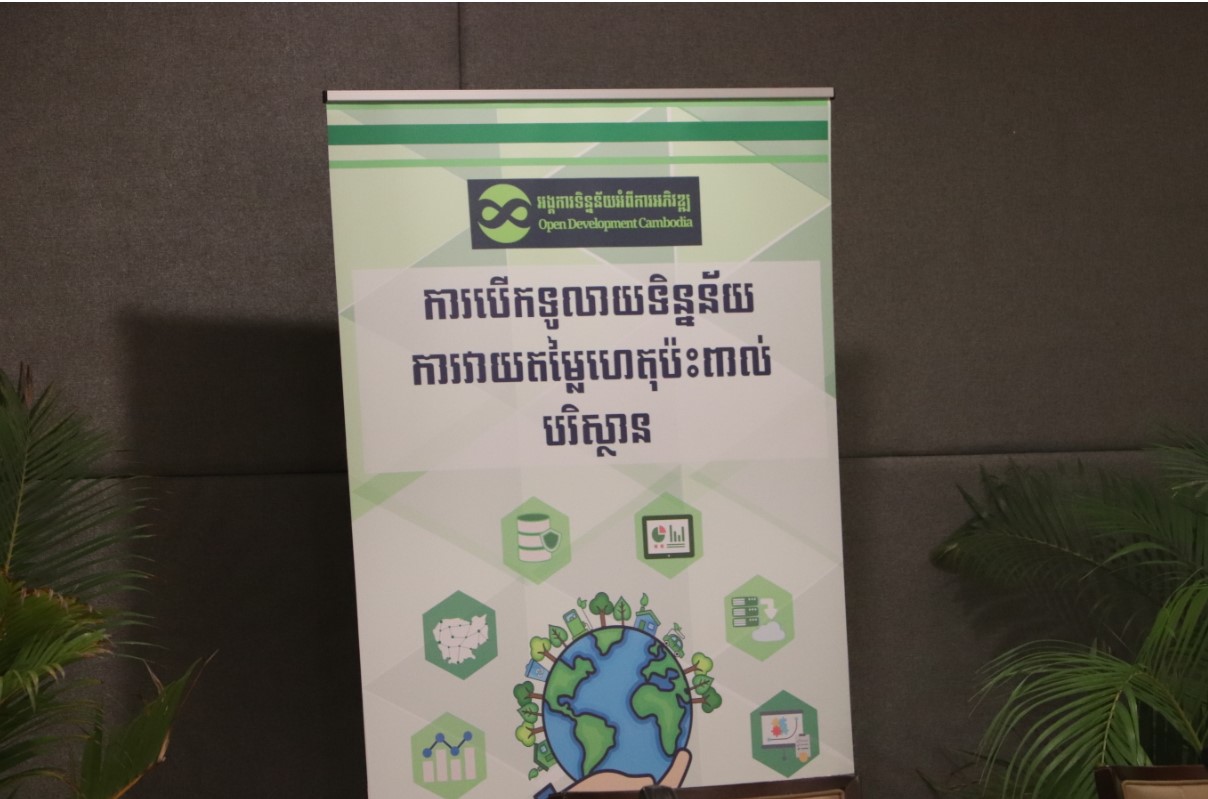
នៅក្នុងប្រទេសកម្ពុជា EIA ត្រូវបានតម្រូវដោយច្បាប់ ហើយភាគច្រើនសម្រាប់គម្រោងអភិវឌ្ឍន៍ធំៗ ហើយវាត្រូវបានពង្រឹងការអនុវត្តបន្ថែមដោយ ច្បាប់ស្តីពីការវាយតម្លៃហេតុប៉ះពាល់បរិស្ថាន និងគោលការណ៍ណែនាំអនុវត្តន៍ល្អបំផុត ដែលតម្រូវឱ្យមានការពិគ្រោះយោបល់និងការចូលរួមជាសាធារណៈ។ ជាក់ស្តែងនាយកដ្ឋានវាយតម្លៃហេតុប៉ះពាល់បរិស្ថាននៃក្រសួងបរិស្ថាន ដែលតំណាងឱ្យតួអង្គរដ្ឋាភិបាល ក៏បានបើកជាសាធារណៈសម្រាប់ការផ្តល់ជាមតិយោបល់និងការចូលរួមពីភាគីពាក់ព័ន្ធនានា ជាពិសេសពីសំណាក់អង្គការសង្គមស៊ីវិលដែលធ្វើការយ៉ាងជិតស្និទ្ធជាមួយសហគមន៍មូលដ្ឋាន ដើម្បីធានាថាកង្វល់របស់សហគមន៍ដែលរងផលប៉ះពាល់ពីគម្រោងនឹងត្រូវបានដាក់បញ្ចូលទៅក្នុងរបាយការណ៍ការវាយតម្លៃហេតុប៉ះពាល់ដំបូង និងនៅក្នុងរបាយការណ៍ពេញលេញ។
ទោះបីការប្រើប្រាស់ EIA កំពុងកើនឡើងក៏ដោយ ក៏លទ្ធភាពទទួលបានរបាយការណ៍ EIA នៅតែមានកម្រិត ។ ជាទូទៅអត្ថបទស្តីពីការងារបច្ចេកទេស និងវិធានការនានានៅក្នុងរបាយការណ៍ EIA ធ្វើអោយសាធារណៈជនមានការលំបាកក្នុងការទទួលបានព័ត៌មានទាំងនោះ។ បើទោះបីជារបាយការណ៍ទាំងនេះ ត្រូវដាក់អោយប្រើប្រាស់ជាសាធារណៈដោយរដ្ឋាភិបាលហើយក៏ដោយ ភាគីពាក់ព័ន្ធនិងប្រជាពលរដ្ឋនៅតែពុំមានលទ្ធភាពទទួលបានព័ត៌មានទូលំទូលាយអំពីខ្លឹមសារនៃរបាយការណ៍ស្តីពីការវាយតម្លៃហេតុប៉ះពាល់នៃបរិស្ថាន ហើយមូលហេតុនេះក៏ជាកត្តារារាំងដល់ការចូលរួមពេញលេញរបស់ប្រជាពលរដ្ឋនៅក្នុងការជជែកវែកញែកអំពីគោលនយោបាយ និងស្វែងរកដំណោះស្រាយផ្លូវច្បាប់ និងប្រើប្រាស់សិទ្ធិរបស់ពួកគេក្នុងការចូលរួមជាសាធារណៈ។
